
Rising TO THE CHALLENGE Texas Association of School Boards 2020 Annual Report A special edition of Texas Lone Star Magazine Volume 38 • Number 10 • December 2020
Q: What has your school board done differently to meet the challenges of this unprecedented school year?

“COVID hit in ways that no school district could ever imagine. Thrust into a whole new world of education, Galveston ISD had to determine how to best serve our community, our students, teachers, and staff during this pandemic. One of our first actions as a board was voting on refining grading guidelines for the 2019-20 school year. We ensured that all our students had meals through various pickup locations in the district. As with all districts, our work didn’t stop there. Planning for the 2020-21 school year was a challenge that no one had ever prepared for. We were honored with virologists and public health representatives from UTMB Galveston speaking at our board meetings about COVID and how we could best protect our district. Our board also put a priority on not only ensuring our teachers and staff received raises, but our substitute teachers also received a raise.
“It was and is of utmost importance to acknowledge the concerns and risks of COVID in our district. Staff and students need to have a safe place to work and learn, even during a pandemic. Our board approved a fully remote school, SAIL (Students Accessing Innovative Learning), for our Pre-K-12 students choosing to not return to on-campus learning. In looking at the 2020-21 school calendar, the board also approved adding additional time to each school day to compensate for potential closures due to COVID. The start of the school year included a twoweek staggered start by grade level. This allowed campuses time to work through safely bringing students back onto campus. Our budget for 2020-21 also includes an additional $300,000 for the purchase of PPE (personal protective equipment), funds to add 38 water bottle filling stations (replacing water fountains), and additional funds to provide professional development for remote instruction.
“As a trustee for Galveston ISD, the one thing I am most proud of during COVID is that our board approved purchasing over 100 biodefense indoor air purifiers from Integrated Viral Protection. These units have been proven to kill 99.9 percent of the SARS COV-2 virus and other airborne pathogens. The purchase includes both smaller, more portable units for the classrooms and larger units for more open areas (cafeteria, gym, large hallways). Having these units will help ensure our students and teachers are safe in their classrooms during this pandemic.”
Monica Wagner, Galveston ISD Trustee
 Photo by TASB Media Services
Photo by TASB Media Services
A special edition of TASB’s Texas Lone Star magazine
December 2020 • Volume 38 • Number 10
James B. Crow • TASB Executive Director
Roger White • Managing Editor
Melissa Locke Roberts • Assistant Editor
Shu-in Powell • Graphic Designer
Amy Rames • Advertising Coordinator
Patrick Morris, Virginia Hernandez • Photographers
360 Press Solutions • Printer
Texas Lone Star (ISSN 0749-9310) is published 10 times a year by the Texas Association of School Boards. Copyright © 2020 by the Texas Association of School Boards (TASB). All rights reserved. Reproduction, adaptation, distribution, and exhibition in whole or in part are prohibited under penalty of law without the written license or permission of TASB.

TASB Officers 2020-21
Jim Rice, Fort Bend ISD, President
Ted Beard, Longview ISD, President-Elect
Debbie Gillespie, Frisco ISD, First Vice-President
Bob Covey, Cypress-Fairbanks ISD, Second Vice-President
Armando Rodriguez, Canutillo ISD, Secretary-Treasurer
Lee Lentz-Edwards, Kermit ISD, Immediate Past President
TASB Board of Directors 2020-21
Moises Alfaro, Mathis ISD, Region 2
Kay Alley, Crosbyton CISD, Region 17
Rose Avalos, Aldine ISD, Region 4H
Kamlesh Bhikha, ESC 2, ESC Representative
Steve Brown, Ector County ISD, Region 18
Kevin A. Carbo, Mesquite ISD, Region 10D
Justin Chapa, Arlington ISD, Region 11C
Yolanda Cuellar, South Texas ISD, Region 1B
Thomas Darden, Cooper ISD, Region 8
Jason Dohnalik, Cameron ISD, Region 6
Karen Freeman, Northside ISD, Region 20B
Corinne French, Valley View ISD, Region 11D
Demetrio D. Garcia, Kenedy ISD, Region 3
Linda Gooch, Sunnyvale ISD, Region 10B
Mary Jane Hetrick, Dripping Springs ISD, Region 13B
Tony Hopkins, Friendswood ISD, Region 4C
Sandy Hughey, North East ISD, Region 20E
Mark Lukert, Wichita Falls ISD, Region 9
Raymond P. Meza, San Felipe Del Rio CISD, Region 15
Dan Micciche, Dallas ISD, Region 10C
Vernagene Mott, Pflugerville ISD, Region 13C
Nicholas Phillips, Nederland ISD, Region 5
Jacinto Ramos Jr., Fort Worth ISD, Region 11B
Page Rander, Clear Creek ISD, Region 4B
Georgan Reitmeier, Klein ISD, Region 4A
Rolinda Schmidt, Kerrville ISD, Region 20A
Cindy Spanel, Highland Park ISD, Region 16
Becky St. John, Grapevine-Colleyville ISD, Region 11A
Anne Sung, Houston ISD, Region 4D
Mildred Watkins, La Vega ISD, Region 12
Greg Welch, Clyde CISD, Region 14
Robert Westbrook, Schertz-Cibolo-Universal City ISD, Region 20D
Follow us:
The Texas Association of School Boards promotes educational excellence for Texas schoolchildren through advocacy, visionary leadership, and high-quality services to school districts.
OF CONTENTS 4 Editor’s Note 6 President’s Message 8 Advocacy & Action ’20 10 TASB Advocacy Agenda 16 TASB 2020-21 Officers 18 TASB 2020-21 Board of Directors 20 Leadership & Learning ’20 27 TASB Revenue & Expenses 28 Kudos & Kids ’20 34 Director’s Chair texaslonestaronline.org | December 2020 | Texas Lone Star 3
Table
Rising UP
Districts, Communities Came Together in Difficult Year
by Roger White
In a year unlike any other in recent memory, school districts and local public education leaders faced challenges almost unimagined at the beginning of 2020. The ongoing COVID-19 pandemic, social unrest, political divisiveness, and dire economic problems weighed heavily on trustees, administrators, teachers, staff members, students, and their parents as schools navigated through myriad concerns and logistical issues.
And still the teachers taught, the students learned, and the local leadership teams steered their districts with gritty determination, unwavering vision, and inspiring, innovative initiatives aimed at providing the best education possible for every child.
As the pandemic spread in early spring, districts across the state sprang into action. In McAllen ISD, for example, the district rose to the challenge by swiftly transitioning to distance learning for nearly 22,400 students at 31 campuses and all grade levels. In Abilene, Abilene ISD and Wylie ISD teamed up to design and create mechanized hospital tables to help local healthcare facilities deliver meals, medicines, and messages to isolated patients.

In Lockhart ISD, the leadership team took the bold step of committing to build seven new network towers to provide internet access to students and families located in “dead zones” throughout the district’s 300-square-mile area.

And in Angleton ISD, district leaders partnered with the Houston Food Bank to expand the Angleton School Market and the district’s unique AISD Fueled Meal Assistance Program to keep its community fed while campuses were closed.
These are just a few examples of the dedication and determination shown by every local public education team in every community.
As always, TASB stood side by side with the school districts of Texas. The Association rapidly transitioned many
Editor's Note
4 Texas Lone Star | December 2020 | texaslonestaronline.org
conferences, workshops, and programs to virtual events with specialized support services. TASB Legal Services, for example, added more than a dozen FAQ documents related to COVID-19 to the online eSource site, where visits jumped by 50 percent.
TASB Policy Service updated Policy On Line to enhance accessibility for individuals with disabilities and published policy information and recommendations on numerous COVID-19 issues.
TASB HR Services produced 180 articles for the HR Exchange newsletter, a 25-percent increase over the previous year, covering topics ranging from compensation to recruiting and hiring to COVID-19 response. The newsletter saw a 209-percent increase in views.
TASB Risk Management supported members in varied ways, from COVID-19 articles and webinars to virtual meetings, training, and expanded online courses.
And yearly Association mainstays, such as Summer Leadership Institute, the TASA | TASB Convention, TASB Delegate Assembly, and more were carried out virtually through the hard work of Association staff and thoughtful cooperation of TASB members statewide.
This TASB 2020 Annual Report, a special edition of Texas Lone Star magazine, reviews this unprecedented year in public education and the Association’s activities and programs in 2020. Although it was a year difficult to fathom, it was a year in which Texas public schools rose to the challenge.H
Highlights 2020
Risk Management Responded with Resilience, Flexibility

This year demonstrated the importance of resilience and flexibility like no other in the TASB Risk Management Fund’s 40+-year history. Fund members and TASB staff worked together in new ways to ensure the critical work of educating Texas students could continue.
Guiding the Fund’s efforts this year were the four strategic goals of continued financial strength, membership retention and growth, continuous improvements in service delivery, and innovation and responsiveness to changing member needs and environment:
Continued Financial Strength. With assets of more than $380 million, the Fund is positioned to meet its obligations and provide for members when the unexpected happens, such as the record unemployment compensation claims prompted by school closures in March.
Membership Retention and Growth. The Fund continues to provide the broadest and most comprehensive coverage option for many education entities across the state. As the largest provider of coverage and a greater than 98-percent membership renewal rate each year, the Fund is the clear choice for Texas school districts and other TASB members.
Continuous Service Improvements. This year, the Fund enhanced in-person and online learning experiences for members and made it easier for them to safeguard their data. A new package of online courses available through SafeSchools launched, giving members the ability to train employees across the district. Locally organized regional training events brought TASB experts to members, so they could spend more time learning and less time traveling. Updated cyber coverage ensures members can get the help they need if they are targeted by phishing or ransomware.
Innovation and Responsiveness to Members’ Needs. The pandemic created a series of opportunities for the Fund to help members manage risks posed by the coronavirus pandemic. From COVID-19 articles and webinars to virtual meetings, training, and expanded online courses, the Fund supported members in numerous ways during these uncertain times. In workers’ compensation, the previously established collaboration with telemedicine providers made it easier for members to offer remote medical care to injured employees during the pandemic, and the Fund issued guidance on filing COVID-19 workers’ compensation claims. The Fund supported members throughout the evolving unemployment crisis, offering expert guidance to answer members’ questions and help them address complicated claims situations.
texaslonestaronline.org | December 2020 | Texas Lone Star 5
Roger White is managing editor of Texas Lone Star.
TASB RISK FUND
Lessons OF 2020 THE
Many Things Learned through an Annus Horribilis
by Jim Rice
Queen Elizabeth II was once quoted as referring to 1992 as having “turned out to be an annus horribilis,” which is Latin for “a horrible year.” While she was referring to a year of turmoil for the royal family, I think she might agree that we could all refer to 2020 as the annus horribilis.
Barely weeks into the year, we all began to hear stories of a new virus that threatened to become a pandemic. By March, the unthinkable had happened—COVID-19 had indeed developed into a full-fledged pandemic and threat to not only the United States but the entire world.
A sharp rise in concern over this novel virus coincided with the 2020 spring break, a time when many families, teachers, and staff use the opportunity to travel—nationally and internationally—which increased the risk of exposure and fear of outbreaks.

Our schools, by their very nature, are designed to facilitate the gathering of hundreds of students in classrooms, lunchrooms, and common areas, creating a perfect storm in terms of incubating and spreading a virus.
A Novel Event
In my own district, Fort Bend ISD, Superintendent Charles Dupre and his staff soon realized that in the interest of public health and safety we could not return students to class on the Monday immediately following spring break. Informing the board of trustees, our students, parents, teachers, staff, and our community of this was an unexpected challenge.
Most of us have lived through weather-related events that caused schools to be closed for days or possibly even weeks, but COVID-19 was something different—a novel event with no foreseeable end. In Fort Bend ISD, and I am sure in every district across the state, it became clearer over the subsequent weeks that we could not resume normal classes and be able to guarantee the safety of students, teachers, and staff.
Soon after, this was recognized on a state level, and the governor ordered a halt to face-to-face instruction.
This action imposed a difficult, expensive, and complicated task for every school administration and teaching staff as they
had to effectively implement online instruction in extremely short order. There was no opportunity to bring all teachers together for development and preparation on how to deliver online instruction. Training of teachers and staff in online instruction had to be done virtually, while everyone feverishly worked from home.
Other Challenges
Other challenges presented themselves, as well, such as providing meals for students who qualify for the federal government’s meal plan and laptops and hot spots for those who needed them. It is a testament to the strength of our public school districts that they all rose to the occasion, providing instruction and meeting the physical, social, and emotional needs for all students in our state.
Though these achievements are commendable, you might agree that schools are still far from being able to welcome all students back to the classroom full time. This pandemic not only forced every school district in the country to react quickly to provide immediate solutions but to also plan for the “new normal” of learning in the 2020-21 school year.
As classes resumed this fall, most school districts have offered both face-to-face (F2F) and online instruction simultaneously. This has created yet another challenge in how best to implement this hybrid system of instruction. The Texas Education Agency suspended the required STAAR testing, class ranking, and other measurements for the 2019-20 school year, but it will return for 2020-21. Schools must grapple with how to help students not only get back up to speed in many cases but also how to measure up while using an entirely new education model.
 Jim Rice
Jim Rice
President’s Message 6 Texas Lone Star | December 2020 | texaslonestaronline.org
Rising to the Occasion
Of course, we also must face the grim possibility that restrictions or quarantines could be reimposed at some point should there be a COVID-19 resurgence—which of late has appeared very likely. We know we must continue to improve the efficacy of both hybrid and online instruction and testing to ensure student academic growth and mastery of the various subjects, no matter the teaching method.
The 2020 year has indeed been a horrible one for public education. The COVID-19 pandemic has forced all of us to embrace a “new normal.” This event is the harbinger of new ways of thinking and doing things that will impact all of us—including teaching and learning.
Although the future remains uncertain and the year remains markedly horribilis, we have shown that by working together as students, teachers, parents, and communities, we can overcome unprecedented challenges. We can—and must—continue to rise to the occasion so that our children, the pride of our families and our nation, will learn and grow into young men and women of character and purpose.H
Highlights 2020
BoardBook® Rolls Out New Projects, Resources
With the launch of BoardBook Premier last fall, the migration of customers from the older, classic version of BoardBook to Premier got well under way. In May, BoardBook Manuals were launched, providing a platform for large resource documents (such as municipal codes and policies) as a pilot project in Michigan. In October, BoardBook Manuals were rolled out to other states.
With social distancing and an increase in members conducting video teleconference meetings, BoardBook created a Zoom plug-in feature, released in October, which streamlines meetings through video teleconferencing platforms. BoardBook has made
available two new templates, courtesy of TASB Legal Services, for emergency meetings and video teleconferencing.
In September, BoardBook updated all self-paced training videos and handouts accessed by users online. These were distributed to all our Texas customers to serve as a resource guide and a supplement to live training.

BoardBook currently has 1,569 customers throughout the United States and Canada—792 in Texas and 776 out of state—and active partner agreements with school boards associations in 11 states and a municipal city consortium.

texaslonestaronline.org | December 2020 | Texas Lone Star 7
Jim Rice, a Fort Bend ISD trustee, is 2020-21 president of TASB.
TASB MEMBERS DETERMINE ASSOCIATION’S
Advocacy DIRECTION
Although the Legislature wasn’t in session in 2020, the year was filled with advocacy initiatives and meetings, as TASB members attended Grassroots Meetings all across Texas, Association delegates determined the TASB Advocacy Agenda for the coming year, and a Texas delegation of trustees traveled to the nation’s capital to attend the National School Boards Association’s (NSBA) 2020 Advocacy Institute.
Grassroots Input
During the 21 regional Grassroots Meetings held across the state this winter, hundreds of trustees told TASB what they believe the Association should advocate for next session. The Grassroots Meetings were the first step in the development of the TASB Advocacy Priorities, which will guide the Association’s advocacy efforts during the 87th Texas Legislature in 2021.
Student mental health jumped to the top of many regions’ local priorities, as several trustees expressed their belief that mental health issues affect various aspects of public education—from student discipline to special education services to teacher retention.
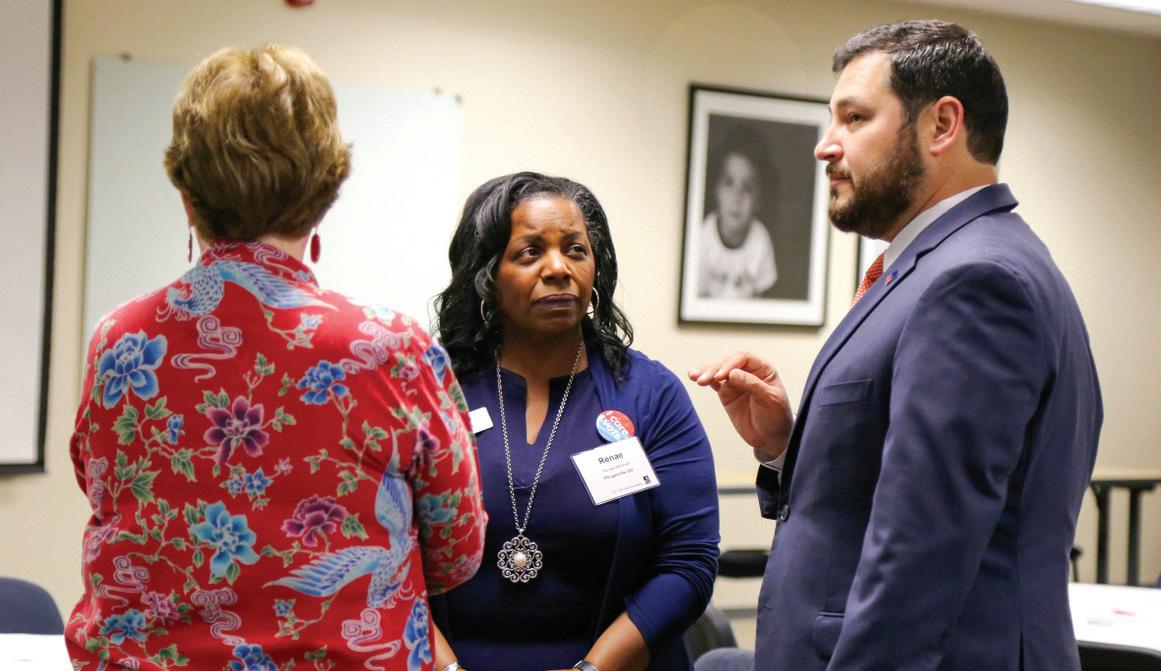

Attendees also voiced concern about the state’s ability to maintain the funding levels created under House Bill 3 last session and the uncertainty surrounding how the bill’s formulas
will ultimately affect districts. They also highlighted other local priorities, such as increasing transparency and expansion of charter schools, maintaining the voice of public schools and other local governmental entities at the Texas Capitol, and opposing the privatization of public education through vouchers or other means.
At the meetings, school trustees and administrators were tasked with identifying their regional priorities via a brief survey and had the opportunity to discuss those issues and their impact on their local students and schools. Attendees then selected trustees to serve on the Association’s Legislative Advisory Council (LAC), which later reviewed all regional priorities and proposed one statewide list of priorities for TASB.
After the LAC developed its list, the TASB Board of Directors reviewed and recommended the draft priorities to the TASB Delegate Assembly.
TASB Advocacy Agenda
School board members from around the state adopted TASB’s new 2020-22 Advocacy Agenda on October 3. For the first time ever, delegates participated in the TASB Delegate Assembly through virtual means. While the structure for submitting motions to consider or amend agenda items was
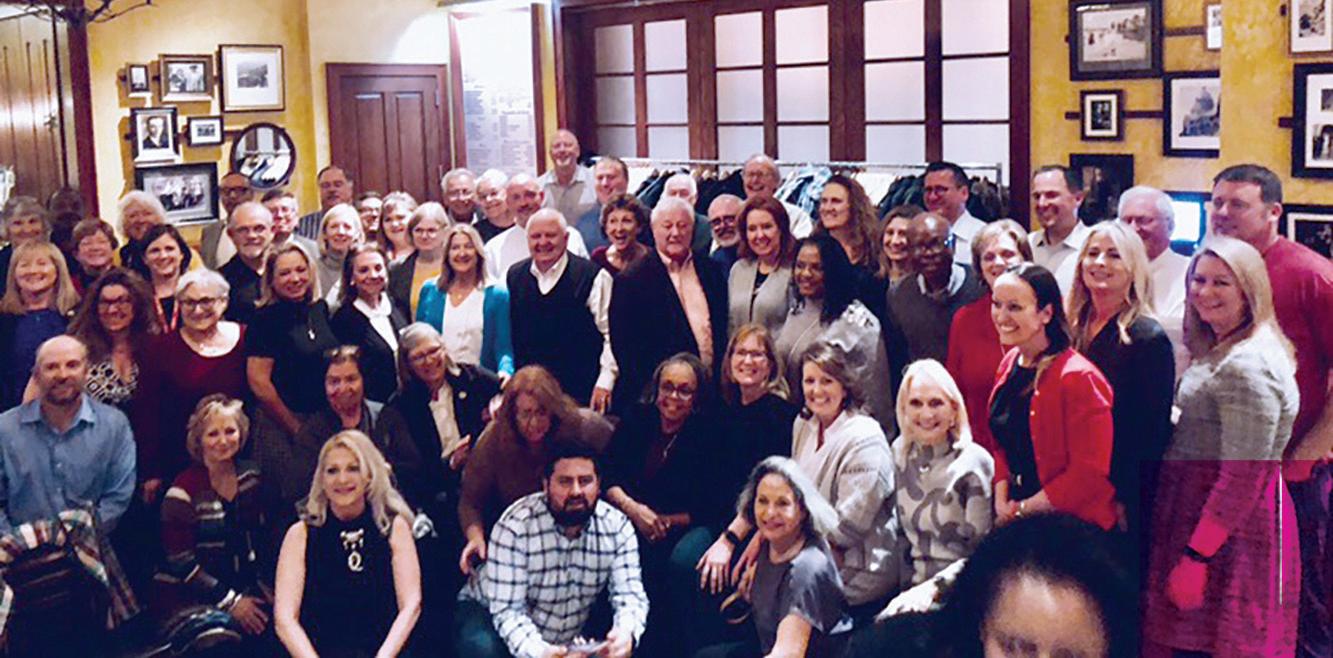
Advocacy & Action ’20
TASB Governmental Relations Director Dax Gonzalez chats with Pflugerville ISD Trustee Renae Mitchell at the Region 13 Grassroots Meeting January 15 in Austin.
Photos by TASB Media Services
Courtesy photo 8 Texas Lone Star | December 2020 | texaslonestaronline.org
The Texas contingent smiles for the camera at the 2020 NSBA Advocacy Institute in Washington, DC. More than 90 local leaders from Texas school districts attended the conference, held February 2-4.
different, discussion and participation was as lively and passionate as has come to be expected.
This new agenda will guide TASB’s advocacy efforts during the 87th legislative session that begins in January 2021 amid its own questions as to how business will be conducted on the Capitol grounds.
At Delegate Assembly, TASB delegates made their voices and those of their students and districts heard on issues ranging from school finance to diversity to charter schools. Delegates also earned continuing education credit and learned about political advocacy from House Public Education Committee Chair Dan Huberty.
Delegates amended the TASB Cornerstone Principles—adding a new principle on promoting equity and eradicating systemic racism— adopted 10 new priorities, and approved 54 new resolutions. The new priorities, which primarily drive the Association’s advocacy efforts, address issues such as funding and flexibility to address COVID-19 concerns, charter school expansion, accountability, and more. The new resolutions, which guide TASB on issues that may come before the Legislature or regulatory agencies, address many more issues, including items specific to certain districts or regions.
The full TASB Advocacy Agenda may be found on page 10. For more information, visit gr.tasb.org.
NSBA 2020 Advocacy Institute
More than 90 local leaders from Texas school districts joined hundreds of other trustees and superintendents from across the country in Washington, DC, at the NSBA Advocacy Institute February 2–4. They learned about important federal education issues impacting Texas school districts, such as the Individuals with Disabilities Education Act, and heard about policy and trends from federal lawmakers and pundits.
During their Capitol Hill visits, members of the Texas delegation met with US Senator John Cornyn (R-Texas) and various members of the Texas congressional delegation.
More than 30 Texas school board members earned a TASB stipend to reimburse the district for the cost of conference registration.H
Highlights 2020 Legal Services Responds with New Resources


This year, TASB Legal Services added over a dozen legal FAQ documents related to COVID-19; online visits to TASB School Law eSource (an online hub of legal information) jumped by over 50 percent.
Like so many other programs and services, Legal Services found new ways to put resources online, with a new course in the Online Learning Center on the Texas Open Meetings Act, a quick online primer on tax rate adoption for 2020, and a webinar posted to eSource with an overview of new Title IX regulations.
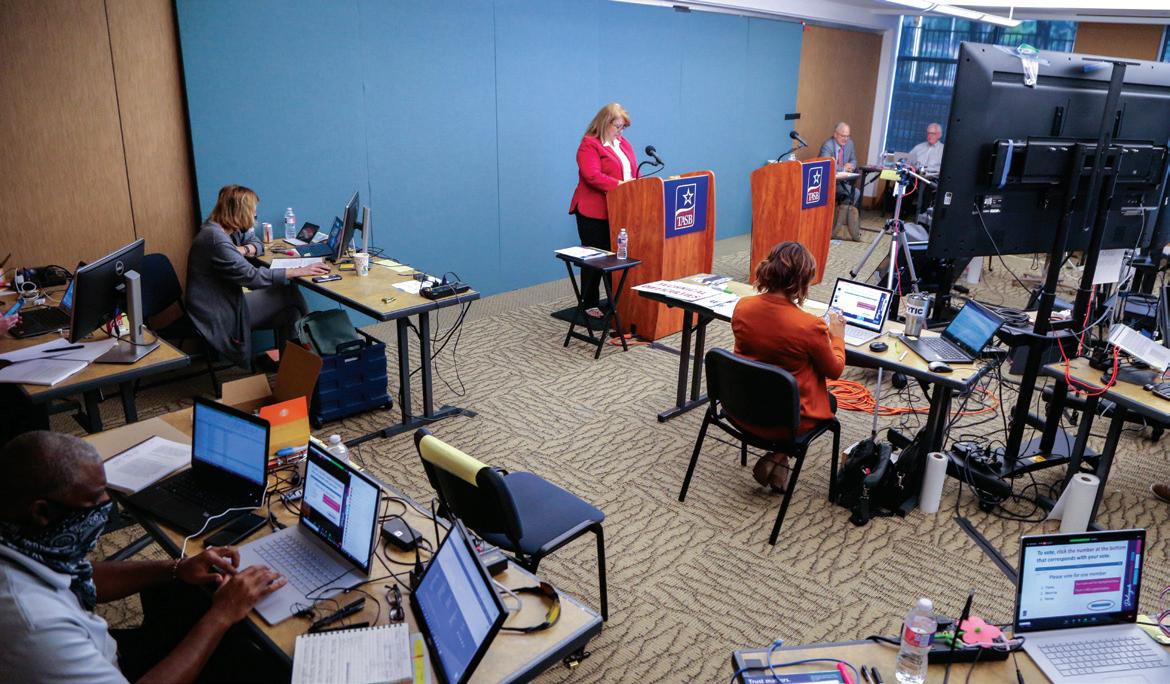
texaslonestaronline.org | December 2020 | Texas Lone Star 9
TASB 2019-20 President Lee Lentz-Edwards (at podium) conducts business during a session of the 2020 Delegate Assembly, held virtually October 3.
TASB 2020-22 ADVOCACY AGENDA
Priorities & Resolutions
The TASB Advocacy Agenda is a two-year action plan that focuses the efforts of the TASB Board of Directors, Association staff, and the more than 1,000 local school boards that constitute TASB. Following are Priorities and Resolutions for the 2020-22 Advocacy Agenda that were adopted by the 2020 TASB Delegate Assembly on October 3, 2020.
Cornerstone Principles
The following Cornerstone Principles guide TASB’s Advocacy Agenda and organizational conduct:
• Excellence in student achievement for all Texas students and fair accountability for academic progress
• Locally elected trustees and locally governed and controlled public schools
• Adequate and equitable funding levels to provide an exceptional education in a safe environment
• Efficient and effective school management
• Strong family and community engagement to create optimal opportunities for each child
• Fulfillment of public schools’ unique constitutional duty to educate every child by preventing the diversion of public funds through vouchers, tax credits, education savings grants, and other mechanisms


• Promotion of equity, intentional eradication of systemic racism, and the recognition of all cultures and races that have contributed to the rich history of Texas and the United States to include support for diversity and cultural awareness initiatives throughout the state
Priorities
(as adopted October 3, 2020, by the TASB Delegate Assembly)
COVID-19 Pandemic
TASB calls upon the Texas Legislature to continue working with local school districts to identify and address student needs
during and after the COVID-19 pandemic and other disasters, such as access to technology and broadband/utility services, mental health resources, meals, social services, personal protective equipment, additional support for economically disadvantaged children, and remediation for students, while maintaining local control. The state should also suspend accountability ratings during disasters that severely impact school operations, such as the current pandemic, enact a temporary moratorium on the expansion or creation of new charter schools, not supplant state education funding with federal funds provided for disaster recovery, and fund schools based on student enrollment to ensure adequate instructional continuity.
Charter Schools
TASB calls upon the Texas Legislature to prohibit the expansion of charter schools, to reduce the impact charter schools have on the state budget and on local public schools, and to increase the transparency of charter schools and their operators, especially with regard to enrollment and expulsion practices, business operations, and expenditures. The state should require charters to have publicly elected board members who are accountable to the communities they serve.
Diversity and Cultural Awareness
TASB calls upon the Texas Legislature to support diversity and cultural awareness initiatives throughout districts through staff and student education and restorative teaching and disciplinary practices that treat all students with equality.
Governance
TASB calls upon the Texas Legislature to recognize and preserve the right of public school boards to associate and collaborate with each other and to communicate the needs of their students and schools, both directly and through representative organizations, with lawmakers.
TASB Advocacy Agenda
10 Texas Lone Star | December 2020 | texaslonestaronline.org
Mental Health and Safety
TASB calls upon the Texas Legislature to increase state funding for access to proactive mental health services and support in public schools to improve the physical safety and psychological well-being of our students and staff, especially as they cope with additional anxiety related to COVID-19. This includes access to services for all students in a school setting, the ability for districts to provide students with targeted interventions, and the establishment of a collaborative network of school and mental health professionals to better identify and meet the needs of students and their caregivers.
TASB calls upon the Texas Legislature to work with public school districts and their locally elected trustees to enhance school safety measures, including increased funding for school safety audits, the school safety allotment, and other measures that ensure the safety of students and staff.
Public School Finance
TASB calls upon the Texas Legislature to aggressively commit to maintain the promises and dedication of funding made in the new school finance system implemented under House Bill 3 (86th Session) and to equitably share the cost of education with local school districts. Further, the state should implement a funding structure that recognizes the flexibility needed by and the additional costs incurred by school districts amid the COVID-19 pandemic.
State Assessments
TASB calls upon the Texas Legislature to continue to reduce state assessments by eliminating those not required by federal law, removing tHe high-stakes aspect of the system, reducing testing time, and prohibiting standardized tests from serving as the primary indicator of school and student performance. TASB advocates for additional support for non-high-stakes, diagnostic assessment alternatives, such as writing portfolios and adaptive exams.
Teacher Recruitment and Retention
TASB calls upon the Texas Legislature to support adaptive and creative local solutions for recruiting and retaining high-quality, diverse educators in our independent school districts and to help elevate the teaching profession by incentivizing students to enter the teaching profession, shoring up teacher health benefits and retirement, and supporting local measures to develop and assess educators.
Vouchers
TASB calls upon the Texas Legislature to prevent any transfer of public education funds through the use of vouchers, savings accounts, or tax credits to private or out-of-state entities, including the unfettered expansion of virtual instruction by corporations.

Q: What has your board done differently to meet the challenges of this unprecedented school year?
“We’ve done many of the same things other boards around Texas have done, but two things stand out as being different during these challenging times.
“First, we made extra efforts to show appreciation and understanding for our teachers and staff. Understandably, people have different levels of comfort with being around others. Some teachers looked forward to getting back in the building with in-person students. Other teachers were hesitant to return due to health and other concerns. As a board, we paid special attention to teachers and staff and went out of our way to show appreciation for the amount of work they put into the return-to-school plans. Trustees sent handwritten notes to teachers, principals, central administrative staff, and others with expressions of gratitude. We made every effort to let staff know their work and time commitment were appreciated.
“Second, we focused on clear and direct communication with parents, staff, and other community members. As we struggled to stay aligned with guidance from state, county, and city health authorities, many community members felt like the board and administration were being unclear about our plans for getting kids back to school. Social media became a swirling rumor mill that drove worry and anger in the community. Our e-mail and public forum comments exploded to numbers we had never seen in our history. We needed to get and stay on top of the message. We ended up not only having to communicate our plans but to also dispel all of the false rumors that were swirling in the community. This was a big challenge that we met with frequent and clear communication from the administration and the board.”
James Spradley, Eanes ISD Trustee
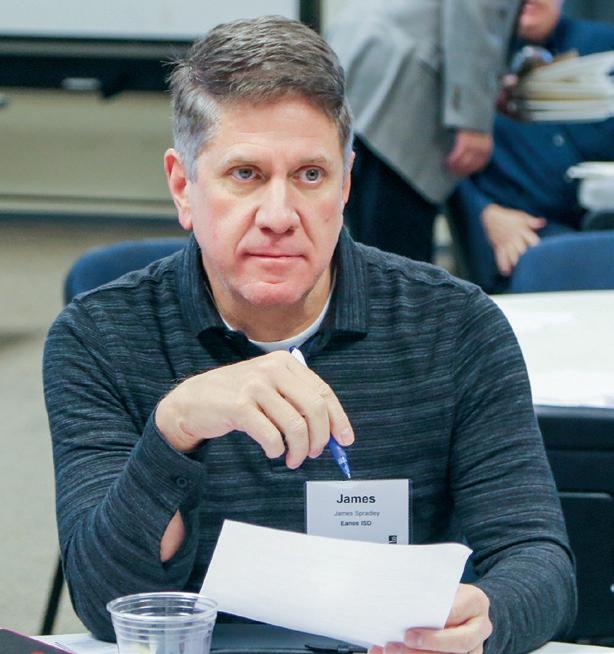
texaslonestaronline.org | December 2020 | Texas Lone Star 11
Photo by TASB Media Services
Resolutions
(as adopted October 3, 2020, by the TASB Delegate Assembly)
Accountability
TASB advocates for legislation that repeals the notion of rating schools or districts on an A–F scale and supports a rating system that places more emphasis on local accountability.

TASB advocates for an accountability system that does not apply the same sanctions to campuses and districts that receive a D rating over two consecutive years as the sanctions applied to F-rated campuses.
TASB advocates for an accountability system in which the Texas Education Agency informs school districts about accountability standards no later than the beginning of the school year in which the standards are to be applied.
Highlights 2020
TASB advocates for the modification of the current accountability system to increase the weight of the communitybased measures for district and campus ratings.
Charter Schools and Privatization of Public Education
TASB advocates for a review and approval process to prevent an oversaturation of charter schools in particular geographic areas.
TASB advocates for legislation that prevents the use of the Permanent School Fund to back charter school bonds with a low underlying rating.
TASB advocates for legislation that requires charter schools to accept all students who wish to enroll, including students with a documented history of discipline problems.
Student Solutions Supports District Special Populations
TASB Student Solutions, launched in February, was created to support districts in the special populations areas of special education, Section 504, English learners, and gifted and talented through the following methods:
Workload Staffing Analysis (special education only). Actual district data is analyzed to assist districts in making staffing decisions to support their specific needs.
Program Review (all areas). A comprehensive look at district processes, procedures, and practices helps districts improve efficiency, sustainability, and student success.
Capacity Building (all areas):
Professional Development. This keeps district personnel apprised of program standards, best practices, and process improvements with a focus on administration and implementation of programs.
Executive Coaching. Coaching provides training and support to various levels of administrators (or other staff identified by district) through the
determination of specific needs, strengths, and areas for improvement and offering intervention for skill development and/or improvement.
In May, the Student Solutions group collaborated with law firm Thompson & Horton LLC to host a series of four webinars that addressed providing services to special populations during the pandemic. Over a four-week period, over 1,700 people attended sessions from 287 districts, 14 education service centers, and 28 shared service arrangements. The information was well received by attendees, with survey ratings of 4.7 stars overall out of 5.
In September, Student Solutions launched a new membership that gives districts tools to help them strengthen special populations programs and meet a new Texas Education Agency regulation requiring districts to submit their special education operating procedures. Through the member-exclusive Student Solutions Online™ portal, districts gain access to customizable model special education operating procedures, resources for running efficient special populations programs, and training opportunities.
12 Texas Lone Star | December 2020 | texaslonestaronline.org
TASB advocates for legislation that would require the commissioner to consider, at a minimum, whether a charter holder has achieved the representations and goals included in its initial charter application.
TASB advocates for legislation that provides state funding for charter schools at a per-student funding level that is no greater than that of the school districts where they are located.
TASB advocates for transparency and notice requirements in charter applications and amendment requests, including specific locations of proposed new campuses, sufficient notice and opportunity for analysis and public comment, and a fiscal note including a charter’s cost to the state, impact on local districts, and cost of anticipated enrollment growth over 10 years.
COVID-19 Pandemic
TASB advocates for no reductions in state funding due to COVID-19.
TASB advocates for ceasing the administration of STAAR™ (State of Texas Assessments of Academic Readiness) standardized testing for the 2020–21 and 2021–22 school years and affording school districts the opportunity to utilize locally developed diagnostic assessment or universal screeners.

TASB calls upon the Texas Legislature to designate “broadband internet access” as an essential utility for the State of Texas by supporting a statewide approach to connect all Texas families to broadband and providing funding so that school districts may update their technology infrastructure for wider access and faster communication to counter the disruptions caused by COVID-19 and other future natural disasters and emergencies.
Due to the funding pressures created by COVID-19, TASB advocates for the removal or delay of the requirement established by House Bill 3 (86th Session) that all kindergarten through third-grade teachers, including special education teachers, and principals must attend a “teacher literacy achievement academy” by the 2022–23 school year.
TASB advocates for district accountability based on industry-based certification be waived due to the unknown factors caused by COVID-19.
TASB advocates that the 90 percent attendance rule for class credit or final grade be waived for the 2020–21 school year.
TASB advocates for the extension of the educator certification waiver created in response to the COVID-19 pandemic for an additional year.
TASB advocates for additional funding to preserve staff during economic recovery.
TASB advocates for the postponement of School Financial Integrity Rating System of Texas (FIRST) ratings for the 2020–21 year.
TASB advocates all retired school personnel be authorized to substitute in a vacant position for up to 90 school days instead of the current 20.
TASB supports using student enrollment in the calculation of the weighted average daily attendance instead of the current “seat time” attendance reporting.
TASB opposes federal waivers on the CARES Act funding that would allow the state to reduce its maintenance of effort, i.e., that allows the state to supplant its funding with federal funds.
TASB calls upon the Texas Legislature to amend current law to authorize school districts to provide their own full remote learning opportunity for their students without limited credit options.
TASB advocates for waiving the requirement in Texas Education Code § 44.008 for districts to submit their annual audit within 150 days of the end of their fiscal year.
TASB advocates for allowing school districts to count as present for purposes of average daily attendance students who receive online instruction during extended absences.
TASB advocates for K–12 public schools to remain “in-person” and not be entirely replaced by a virtual learning platform, except when it would threaten the health and safety of students or staff.
Governance
TASB advocates that trustees of independent school districts maintain all powers and duties to govern their respective school districts if not otherwise outlined in statute and that those rights should be preserved and protected from any state agency or other entity that would substitute its judgment for the lawful execution of those powers and duties by trustees of independent school districts.
TASB opposes legislation that increases ballot language requirements, limits dates upon which elections may be held, or creates additional requirements for voter-approved tax rate elections and bond elections, such as voter turnout thresholds.
TASB calls upon the commissioner of education, State Board of Education, and Texas Education Agency to collaborate with public education stakeholders when drafting
texaslonestaronline.org | December 2020 | Texas Lone Star 13
Q: How have your board and your district met the challenges and hurdles of this year?
“It has been a trying and testing year, but we have a very good board team and an administration that has worked very hard to survey the staff, the community, and the students for their ideas and concerns. On top of all those concerns, our seasoned superintendent—Dr. Paul Clore—retired. We went through the search and have selected Dr. Michelle Cavazos as the new superintendent.
“Our district is truly blessed with industrial growth, and we were able to budget pay increases, study and plan for safe operations, and increase our technology to meet student and staff needs for synchronous and asynchronous instruction. We phased in face-to-face instruction and have now accepted all of the students who opted for face-toface or virtual academy.
legislation and rules to enact policy that is in the best interest of students and schools.
TASB advocates for legislation that will ensure the authority to make decisions regarding district consolidation will remain with local school districts.
TASB advocates for legislation that requires that local boards of trustees have discretion over the spending of any additional funding dedicated to compensation of district staff.
TASB opposes adding measures or initiatives that would designate use of Foundation School Program funding for mandated programs thereby lessening local discretionary funding per pupil.
TASB advocates for ceasing the crossing of district boundaries to transport students into another district without interlocal agreements.
TASB advocates for the continuation of the Texas Tax Code Chapter 313 as currently allowed by state statute and extending the current expiration date of the program.

TASB advocates for removing “transfer annually” from Texas Education Code § 25.036 and adding language making school transfer agreements terminable at any time by either the district or parent.
“We continue our planning for longterm strategies and passage of a large bond for new facilities. We are keeping our eyes wide open for unplanned incidents. We are growing through this unusual time but feel very confident that our students and staff are safe, the learning is happening, and we are on the right track.”
Instructional Materials and Curriculum
TASB advocates for legislation that adequately funds the Instructional Materials Allotment (IMA) to ensure districts are able to meet increasing costs and adequately fund required materials adoptions. Legislation also should be explored that would serve to tie funding under IMA to the State Board of Education proclamations that are issued. Finally, the statute governing IMA should be revised to include an element of permanency as the current language leaves funding to the whim of each legislative session.
TASB calls upon the Texas Legislature to require that the State Board of Education streamline the Texas Essential Knowledge and Skills, limiting standards for each subject at each grade level to what can be taught prior to state-mandated tests within the given school year.
TASB advocates for a requirement to allow the use of open education resources in agreements and memorandums of understanding between local education districts and institutions of higher education regarding textbooks and educational resources for dual-credit programs.
TASB advocates for the inclusion of industry-based and military professionals in the Texas Essential Knowledge and Skills (TEKS) streamlining process for the purpose of TEKS prioritization and alignment with the goal of college, career, and military readiness for all students.
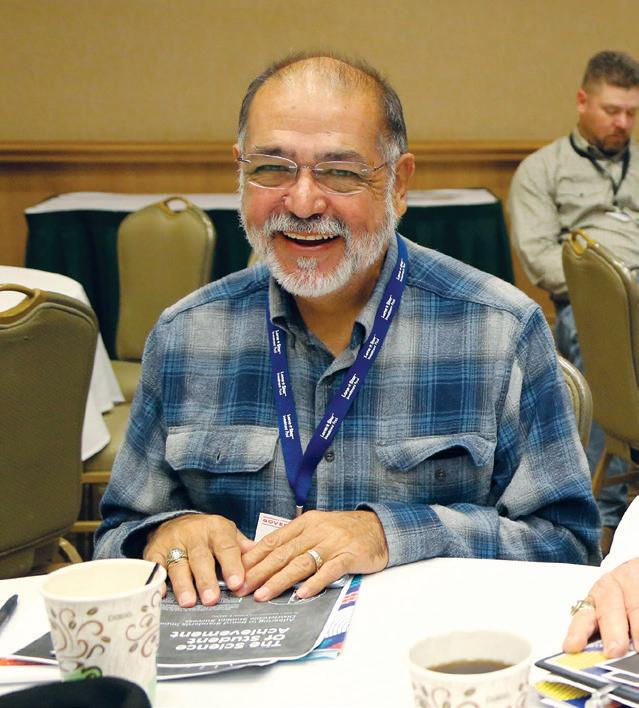
14 Texas Lone Star | December 2020 | texaslonestaronline.org
Rey Rojas, Gregory-Portland ISD Trustee
Photo by TASB Media Services
TASB advocates that all students have access to an equitable delivery of music, dance, theatre, and visual arts education taught by certified fine arts educators.
Public School Finance
TASB advocates for increased sustainable state revenue sources to ensure the continued financial support to school districts provided by House Bill 3 (86th Session).
TASB advocates for legislation that reviews modifications made to the state maximum compressed tax rate outlined in House Bill 3 (86th Session).
TASB advocates for legislation that improves funding for facilities, such as through the Existing Debt Allotment, Instructional Facilities Allotment, and New Instructional Facilities Allotment, to include a higher percentage of students and so that funding is provided for fast-growth districts.
TASB advocates for greater transparency of district tax revenue by creating a separate line item in each taxpayer’s bill that shows the portion of district maintenance-andoperations tax revenue recaptured by the state.
TASB advocates for the Texas Legislature to share the cost of funding public schools by providing at least 50 percent of the Foundation School Program formula funding.

TASB advocates for modifying the property value study to increase the margin of error from 5 percent to 10 percent and, if the local appraisal roll value is deemed invalid, to allow a school district to qualify for a grace period if the appraisal district made a good-faith effort to appraise at market value.
TASB supports legislation that exempts public school buses from paying tolls for use of toll roads operated by the state and regional mobility authorities or their contractors.
Student Issues
TASB advocates for full funding for statewide, universal, high-quality, full-day prekindergarten programs to include facilities.
TASB advocates for adequate funding and support for special education.
TASB advocates for the protection of vulnerable student groups, such as English language learners, those with special needs, or those from low-income families who tend to feel the brunt of education cuts, and ensure that any cuts made to education do not fall disproportionately on these high-need student groups.
TASB advocates for legislation that examines current student enrollment growth and considers adjusting the basic allotment and/or special program weights to adequately fund the educational needs of special populations to include those with limited English proficiency, special needs, economic disadvantage, or factors that qualify them as at risk.
TASB advocates for an assessment system that recognizes students who have successfully completed advanced coursework and prohibits the administration of state exams for courses completed in previous grades by those students.
Teacher and Staff Issues
TASB advocates for choice of healthcare insurance providers.
TASB calls upon the Texas Legislature to increase state funding of TRS-ActiveCare and TRS-Care so that the benefits for and contributions from district employees are equivalent to state employees under the Employees Retirement System of Texas.
Highlights 2020
Executive Search Services Completes Busy Year
TASB Executive Search Services (ESS) helped 26 boards find new superintendents this year and is currently conducting five searches, supporting board members through the process from start to finish. ESS hosted three successful mock interview events, one in person and two held virtually. Applicants are working closely with ESS consultants and field representatives to strengthen their interview skills and resumes.
With over 30 years of industry experience, ESS is proud to report that more than 90 percent of board members and superintendents say they are satisfied with services provided by ESS and are likely to recommend their services to others.
texaslonestaronline.org | December 2020 | Texas Lone Star 15
TASB 2020-21

Officers
Jim Rice joined the Fort Bend ISD Board in May 2010. He has served as both board president and secretary and currently chairs the board’s Audit Committee.

Elected to the TASB Board of Directors in 2012, he chaired the Legislative Committee during the 84th and 86th legislative sessions. He is a 2013 graduate of Leadership TASB. Rice is the founder and president of Rice and Gardner Consultants, Inc., an engineering and construction management firm. In addition to his professional duties, he serves as the Fort Bend Chamber of Commerce’s Education Division vice-chair and is a 2005 graduate of the Fort Bend Chamber of Commerce’s Leadership Forum Class. He is cofounder of the charity Fort Bend Cares, which benefits underprivileged youth in the community. Rice is involved in numerous other civic organizations, including the Fort Bend Literacy Council and Fort Bend P-16 Regional Council, and is currently a director on the Greater Fort Bend Economic Development Council.
Ted Beard was elected to the Longview ISD Board in 1998 and has served in various capacities, including assistant secretary, secretary, vice-president, and president.

Beard earned a bachelor’s in human services from LeTourneau University and now works as a technical expert and equal employment opportunity counselor for the Social Security Administration. He is a retired sergeant major from the US Army and a combat veteran of Desert Shield/ Storm and Iraqi Freedom.
In 2007, Beard was appointed to the TASB Risk Management Fund Board and currently serves as chair. He is a 2012 graduate of Leadership TASB as well as a past president and current member of the Texas Caucus of Black School Board Members.
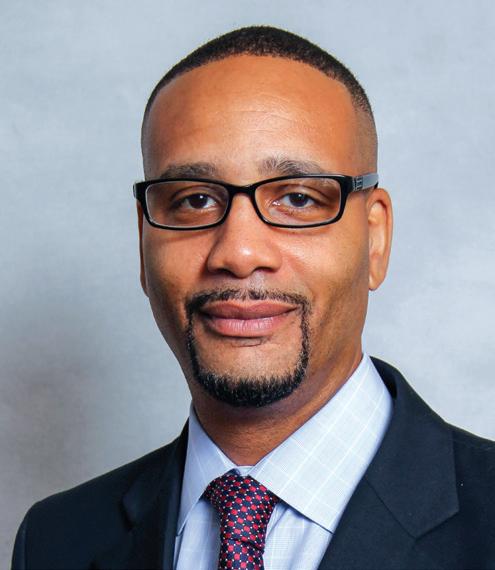 Jim Rice President
Ted Beard President-Elect
Jim Rice President
Ted Beard President-Elect
TASB 2020-21 Officers
16 Texas Lone Star | December 2020 | texaslonestaronline.org
10 years. He retired from American Alloy Steel, Inc., after 35 years but was asked to resume working in sales eight years ago.
Debbie Gillespie was elected to the Frisco ISD Board in 2011 and to the TASB Board in 2014. After graduating from Southwest Texas State University, she worked in interior design and fashion merchandising and then moved to Dell Corporation, where she worked in customer service, configuration management, and policy and procedures.
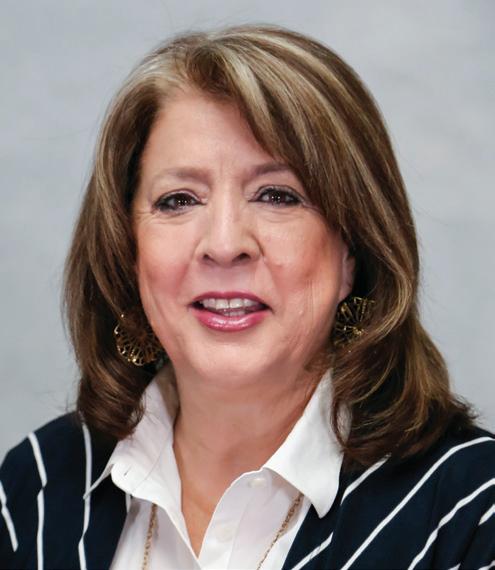
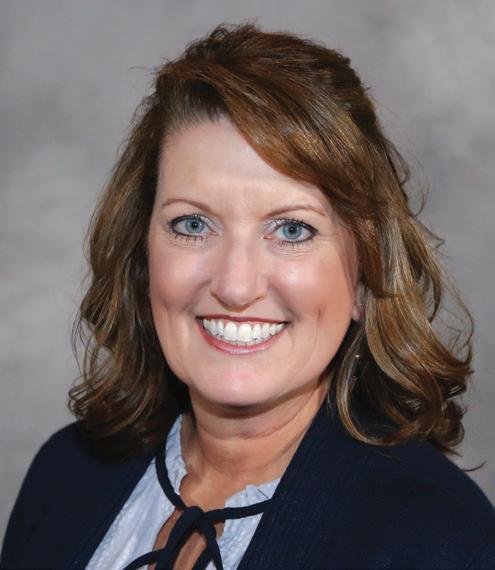
Upon moving to Frisco with her family in 1995, she became an active community volunteer with Frisco Family Services, Starwood Neighborhood Association, Frisco ISD Council of Parent-Teacher Associations (PTA), multiple local PTA boards, Parent-Teacher Organization (PTO) board, Frisco High School Band Boosters, National Charity League, and the Young Men’s Service League, and assisted many charity organizations.
Currently, she volunteers with Frisco Fastpacs and Frisco Women’s League and is a passionate advocate for public education. She is a 2014 graduate of Leadership TASB (LTASB), member of the LTASB Alumni Association, and an Honorary Life Member of PTA.

Bob Covey has served on his local board, CypressFairbanks ISD, for more than 15 years and has held the positions of president, vice-president, and secretary. A Leadership TASB graduate and Master Trustee, he is an active member and former director of the Gulf Coast Area Association of School Boards.
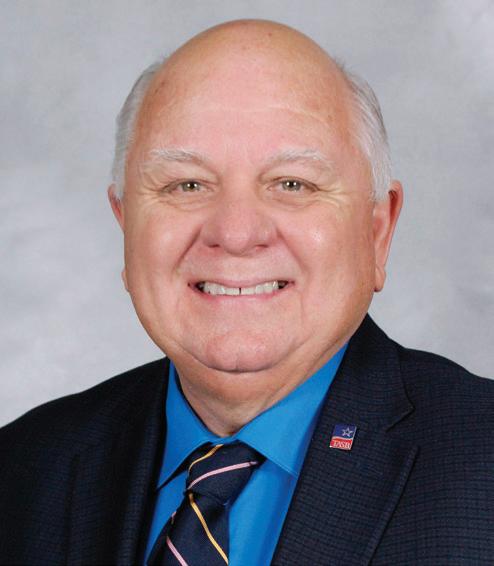
At the local level, he is a member of the Cy-Fair Houston Chamber of Commerce and has participated in the district’s athletic and chorale booster clubs, Bus Buddies program, and Read Across America initiatives. Each semester for the past 15 years, Covey has lectured about school board governance to junior education majors at the Texas State University College of Education. Covey is founder and president of Go Public Gulf Coast. He also is active in Impact at the Harris County Department of Education and in Christ the Redeemer Catholic Church.
Covey earned his bachelor’s degree at Texas State University. He has held numerous leadership positions with the university’s alumni associations, including serving as past president of the Texas State Alumni Association and member of the College of Education’s Alumni Advisory Committee for
Armando Rodriguez Secretary-Treasurer
Armando Rodriguez is serving his fourth term on the Canutillo ISD Board, where he has served as secretary, vice-president, and president. A Canutillo High School graduate, he has attended board meetings since the eighth grade. He was elected to the board in 2005 at the age of 20—the youngest person to win an elected office in El Paso County—and is recognized among school trustees in the region as an advocate for education and educators.
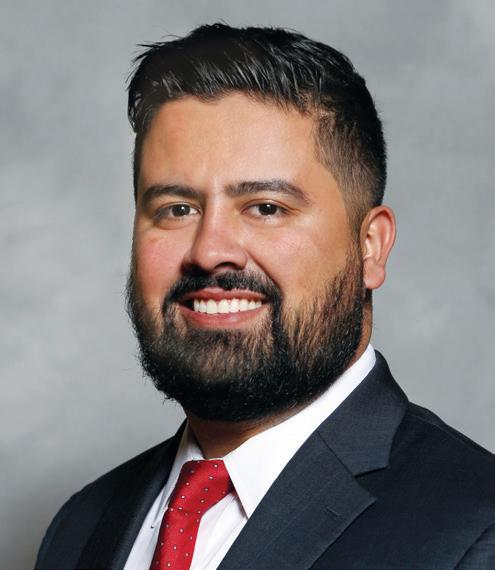
Rodriguez is involved with a variety of education and community boards in Texas and nationally, including the Mexican American School Boards Association, where he served as president; the National Hispanic Council of School Board Members, currently serving as chair; the National Association of Latino Elected and Appointed Officials; and the Far West Texas School Boards Association, where he is a former president.
A graduate of The University of Texas at El Paso, he is the business development manager of Hellas Construction, Inc.
Lee Lentz-Edwards
Immediate Past President
Lee Lentz-Edwards has been serving on the Kermit ISD Board for 15 years. A 2013 Leadership TASB graduate, she is currently in her fifth term as president of her local board. She is a graduate of Sul Ross State University with a bachelor of business administration, master of education, and master of business administration. She has a long tenure in the field of education. Currently, she is a coordinator of special populations at the Region 18 Education Service Center.
Lentz-Edwards has been active in her community, having served as a leader in both Girl Scouts and 4-H, a Sunday school teacher at her church, and a member of the Kermit Rotary Club, where she held the officer positions of secretary and president. She has been honored as a Woman of Distinction by the Permian Basin Girl Scout Association, Outstanding Adult 4-H Leader District VI, and Kermit Woman of the Year.
Debbie Gillespie First Vice-President
Bob Covey Second Vice-President
texaslonestaronline.org | December 2020 | Texas Lone Star 17
TASB 2020-21 Board of Directors
TASB Region 1
Yolanda Cuellar, 1B South Texas ISD
TASB Region 2
Moises Alfaro Mathis ISD
TASB Region 3
Demetrio D. Garcia
Kenedy ISD
TASB Region 4
Georgan Reitmeier, 4A Klein ISD
Page Rander, 4B Clear Creek ISD
Tony Hopkins, 4C Friendswood ISD
Anne Sung, 4D Houston ISD
Bob Covey, 4F Cypress-Fairbanks ISD
Rose Avalos, 4H
Aldine ISD
TASB Region 5
Nicholas Phillips Nederland ISD
TASB Region 6 Jason Dohnalik Cameron ISD
TASB Region 8
Thomas Darden Cooper ISD
TASB Region 9
Mark Lukert Wichita Falls ISD
TASB Region 10
Debbie Gillespie, 10A Frisco ISD

Linda Gooch, 10B Sunnyvale ISD
Dan Micciche, 10C Dallas ISD
Kevin A. Carbo, 10D Mesquite ISD
TASB Region 11
Becky St. John, 11A Grapevine-Colleyville ISD
Jacinto Ramos Jr., 11B Fort Worth ISD
Justin Chapa, 11C Arlington ISD
Corinne French, 11D Valley View ISD
TASB Region 12
Mildred Watkins La Vega ISD
TASB Region 13
Mary Jane Hetrick, 13B Dripping Springs ISD
Vernagene Mott, 13C Pflugerville ISD
TASB Region 14
Greg Welch
Clyde CISD
TASB Region 15
Raymond P. Meza San Felipe Del Rio CISD
TASB Region 16
Cindy Spanel
Highland Park ISD
TASB Region 17
Kay Alley
Crosbyton CISD
TASB Region 18
Steve Brown Ector County ISD
TASB Region 19
Armando Rodriguez, 19B Canutillo ISD
TASB Region 20
Rolinda Schmidt, 20A Kerrville ISD
Karen Freeman, 20B Northside ISD
Robert Westbrook, 20D Schertz-Cibolo-Universal City ISD
Sandy Hughey, 20E North East ISD
Statewide
Jim Rice Fort Bend ISD President
Ted Beard Longview ISD President-Elect
Lee Lentz-Edwards
Kermit ISD Immediate Past President
Kamlesh Bhikha
ESC 2
ESC Representative
18 Texas Lone Star | December 2020 | texaslonestaronline.org
Highlights 2020
Policy
Service Issues Updates, Video Overviews
During the past year, TASB Policy Service updated Policy On Line to enhance accessibility for individuals with disabilities. Policy Service published policy information and recommendations on numerous COVID-19 issues and moved quickly to implement new Title IX regulations into policy manuals. The division also provided video overviews of Update 114 (our largest post-legislative update) and Update 115.
In other highlights, Policy Service issued two updates to Education Service Center Policy Manuals and published updates to the Model Student Handbook, Model Student Code of Conduct, and Regulations Resource Manual.
Q: Can you tell us briefly how your district has met the challenges and hurdles of this year?

“Texas City Independent School District (TCISD), like all school districts across this country, was not exempt from this international pandemic of 2020. Our students went out on spring break and did not return to their classrooms. Our seniors didn’t know how or if they would have a graduation ceremony. TCISD met and faced these challenges by relying on experienced leadership, knowledgeable and flexible staff, gracious and patient communities, and resilient students.
“The initial challenge was to flip student instruction from an in-person modality to all virtual learning with limited technology and minimal experience with distance learning. Our curriculum and instruction department formulated an instructional plan that utilized the district’s Learning Management System to create grade-specific engaging lessons that provided instructional continuity. They then continued this work and developed the district’s synchronous and asynchronous virtual instructional plan as we started the 2020-21 school year—all of this while our deputy superintendent was doubling as our interim superintendent.
“Faced with the technology hurdle created by the pandemic, our board of trustees found the funding and supported an initiative that provided laptops to all district students. Hotspots were also provided to those students who did not have internet service at home. The TCISD COVID Taskforce led the district in providing guidelines and procedures for keeping students and staff safe and healthy as the district opened for faceto-face instruction. In the spirit of our TCISD community, led by our school board, administration, and staff, we have worked to ensure all students continue to receive a high-quality education, whether virtually or in the schoolhouse. Our 2020 seniors at LaMarque High School and Texas City High School, in keeping with COVID guidelines, had beautiful graduation ceremonies at their respective home football fields.”
Melba Anderson, Texas City ISD Trustee
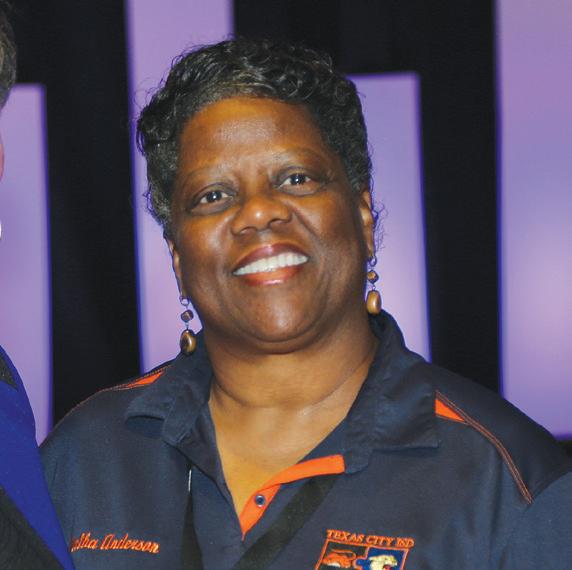
texaslonestaronline.org | December 2020 | Texas Lone Star 19
Photo by TASB Media Services
TASB PROGRAMS:

CORNUCOPIA OF
A 'Virtual ' EVENTS, SESSIONS

Governance Camp
Who knew that this year’s TASB Governance Camp would be the first and last large in-person gathering we would have for members in 2020? The reimagined “Governance Camp: Powered by Student Voice” was held February 26-29 in Galveston—before the full onset of the COVID-19 pandemic. Overall attendance, not including students, was up by 7 percent, with school board member attendance up by 9 percent.
The preconference Poverty Simulation involved more than 100 participants, including students, and General Session speakers Merlyna Valentine and Justin Forsett each received high praise. The additional focus on Student Voice made Governance Camp unique among TASB events, well received by board members and administrators alike. Approximately 200 students were involved in presenting one of the 21 breakouts, manning one of the 15 exhibits, and attending the conference alongside school board members and superintendents.
This year’s student panel scholarship award winners were Tracy Ly of Anahuac ISD, Sofia Moore of Austin ISD, Loralei
Briley of Brownwood ISD, and Camryn Hoffman of Lytle ISD. Mark your calendars for March 3-6, 2021. Registration and housing open in January.
Special Education Solutions Conference
Despite COVID-19 issues, this year’s virtual event, held on May 1, attracted more than 300 attendees and was greatly received. Districts were assisted with managing their programs during the pandemic with resources such as COVID-19 FAQs, webinars, and Provider Relief Fund guidance.
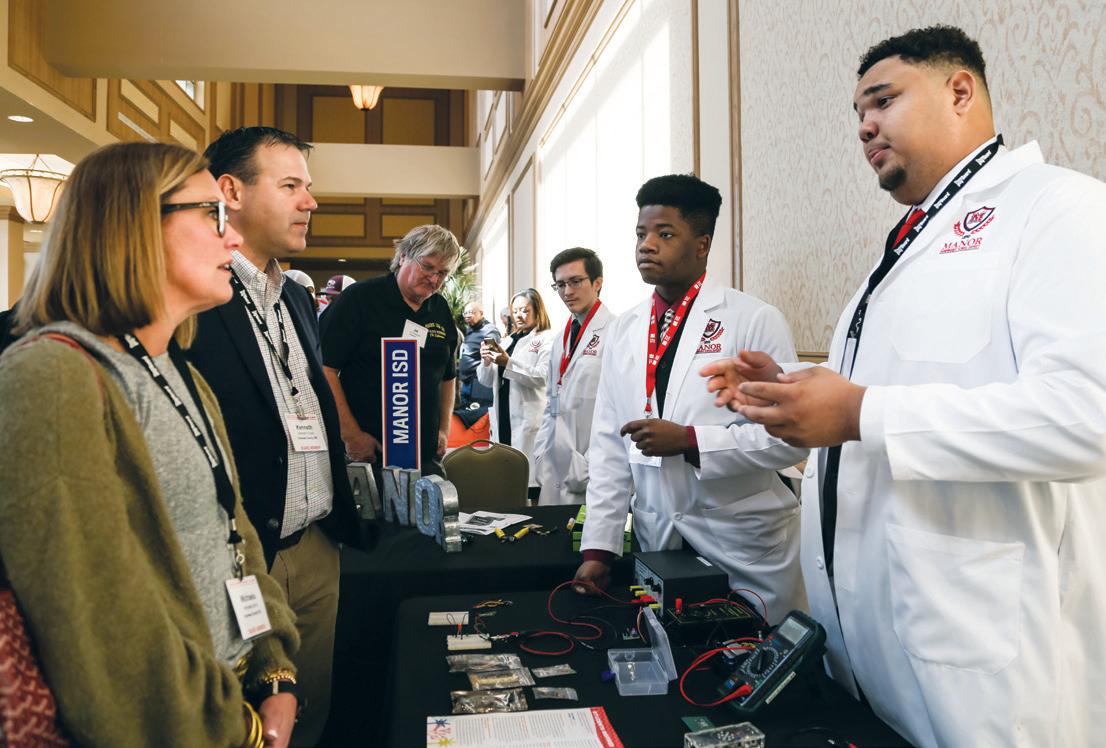
Spring Workshops
As with many events, the 2020 TASB Spring Workshops looked a little different this year. Due to the COVID-19 pandemic, TASB offices closed just as Spring Workshops kicked off; staff travel was halted. The Association came up with a swift solution, providing 11 virtual Spring Workshop webinars in April and May, offering 13 continuing education hours. Sessions were presented by a mix of TASB staff, Leadership TASB alumni, and Texas Education Commissioner Mike Morath.
Although members missed the in-person training and engaging with neighboring members at the traditional Spring Workshops, total attendance at the virtual workshops topped 2,040. These virtual sessions were well received by members and were the first of many virtual events and trainings throughout the year.
Summer Leadership Institute
This year’s Summer Leadership Institute, held virtually June 24-26, was TASB’s first attempt at hosting a virtual conference over a period of days for more than 1,000 people. With less than five weeks to switch from a live event to a virtual one, TASB staff created teams to ensure that all aspects of a virtual event were covered—exhibit hall, in-betweensession activities, social media and attendee engagement, technical production, technical support for our attendees, and conference programming.
Leadership & Learning ’20
Manor ISD students discuss their exhibit with Aransas County ISD Board Secretary Michaela Alston and Board Vice-President Kenneth Cruzan at the TASB Governance Camp February 26-29 in Galveston.
20 Texas Lone Star | December 2020 | texaslonestaronline.org
Photos by TASB Media Services
To ensure there were plenty of opportunities for attendees to visit and catch up, Leadership TASB alumni and TASB staff hosted two scheduled networking session times in the evenings— Night Owl Networking on Wednesday and the Chatty Hour on Thursday. TASB Executive Director James B. Crow kicked off the Wednesday Twilight Sessions, and TASB 2019-20 President Lee Lentz-Edwards introduced the Thursday morning general session speaker.
More than 1,800 attendees joined the live event, and the event chats were filled with compliments and gratitude for a fun and successful virtual event. Registered attendees had access for 30 days of ondemand viewing after the event to earn additional continuing education credits.
Highlights 2020
First Public Records Dynamic Growth, Increased Opportunities
First Public, a subsidiary of TASB that administers the Lone Star Investment Pool and the TASB Benefits Cooperative, provides Texas school districts investment opportunities and employee benefit services, respectively. Those programs reported exciting growth during the 2019-20 fiscal year.

FIRST PUBLIC
The Lone Star Investment Pool reached $13.5 billion in average annual assets, peaking at just under $18 billion, while continuing to provide competitive investment pool rates for school districts.
The TASB Benefits Cooperative saw overall participation grow to more than 108,000 employee lives. This represents several different types of districts that use the Benefits Cooperative for services such as consulting or a portion of benefits administration. First Public offered all virtual online enrollment for the safety of district staff and continued to receive high marks for guiding employees to appropriate insurance choices for their families. Unique healthcare insurance plans for non-TRS-ActiveCare districts have been delivered to a number of Texas districts via the Cooperative’s awarded providers. The TASB Benefits Cooperative also continues to bring value to TRS-ActiveCare districts with custom voluntary benefits and services.
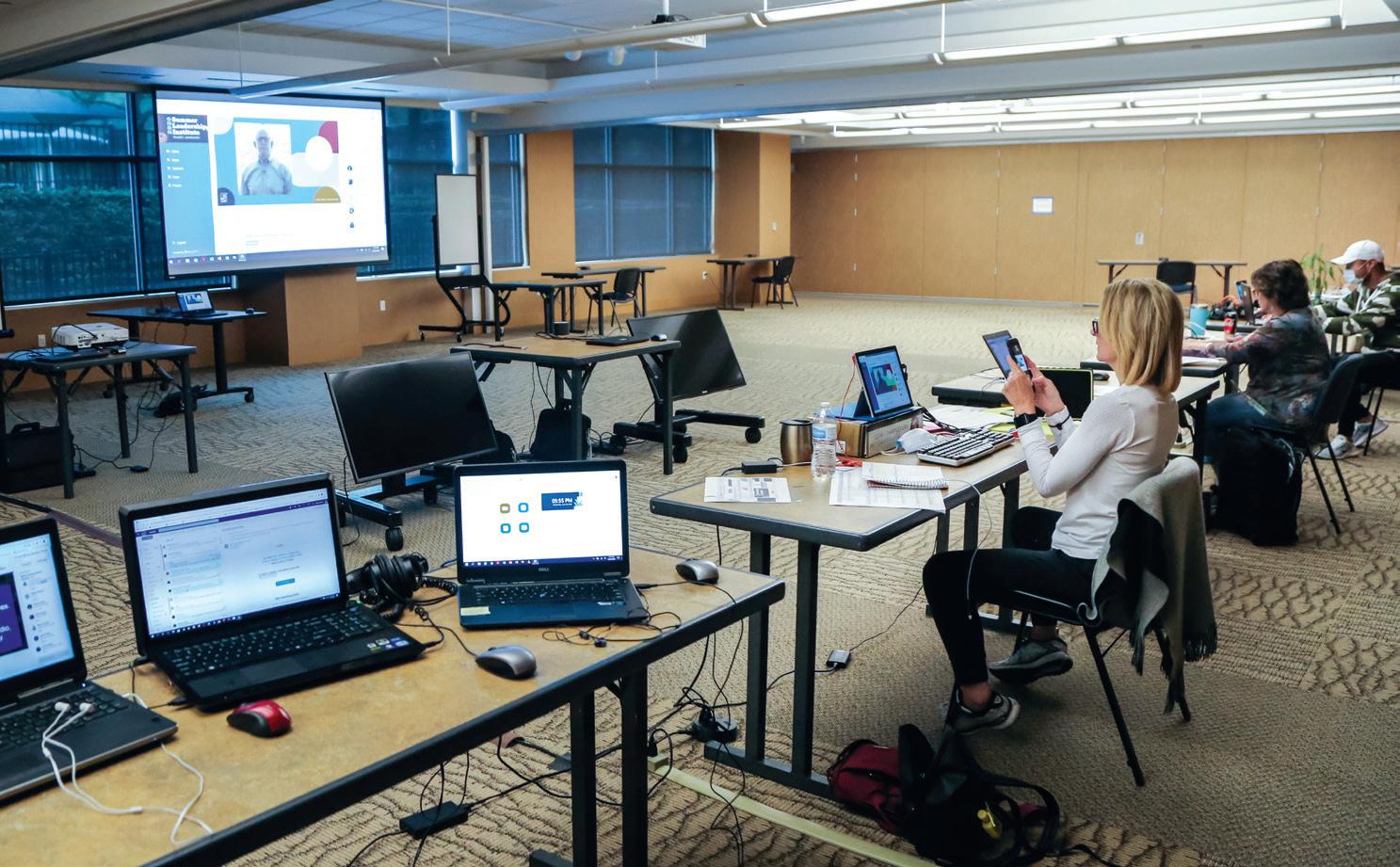
texaslonestaronline.org | December 2020 | Texas Lone Star 21
TASB staff members keep things running smoothly behind the scenes at TASB headquarters during the Association’s virtual Summer Leadership Institute held June 24-26.
FINRA/SIPC
Member
txEDCON2020: TASA | TASB Convention
The largest convening of Texas public education policymakers also went virtual this year, held online September 30 through October 2. Convention provided inspiration to attendees with General Session speakers Shawn Achor and Cynthia “Cynt” Marshall, who related their messages to public education and provided useful suggestions to help improve work environments and personal relationships.
Attendees took advantage of opportunities to network using the chat feature, with many participating via Zoom on Wednesday evening discussing important topics such as equity, social justice, and leadership during crisis.


In its second year, the Community Service Center sponsored by BuyBoard, Direct Energy, E3, and TASB Facility Services was virtual, as well. Attendees were able to participate by stuffing bags virtually using a specially designed application. Two thousand hunger and hygiene kits were donated to homeless children in Dallas-area schools.
More than 160 districts were recognized as having their entire leadership team in attendance at Convention this year, more than any in the history of the TASA | TASB Convention.
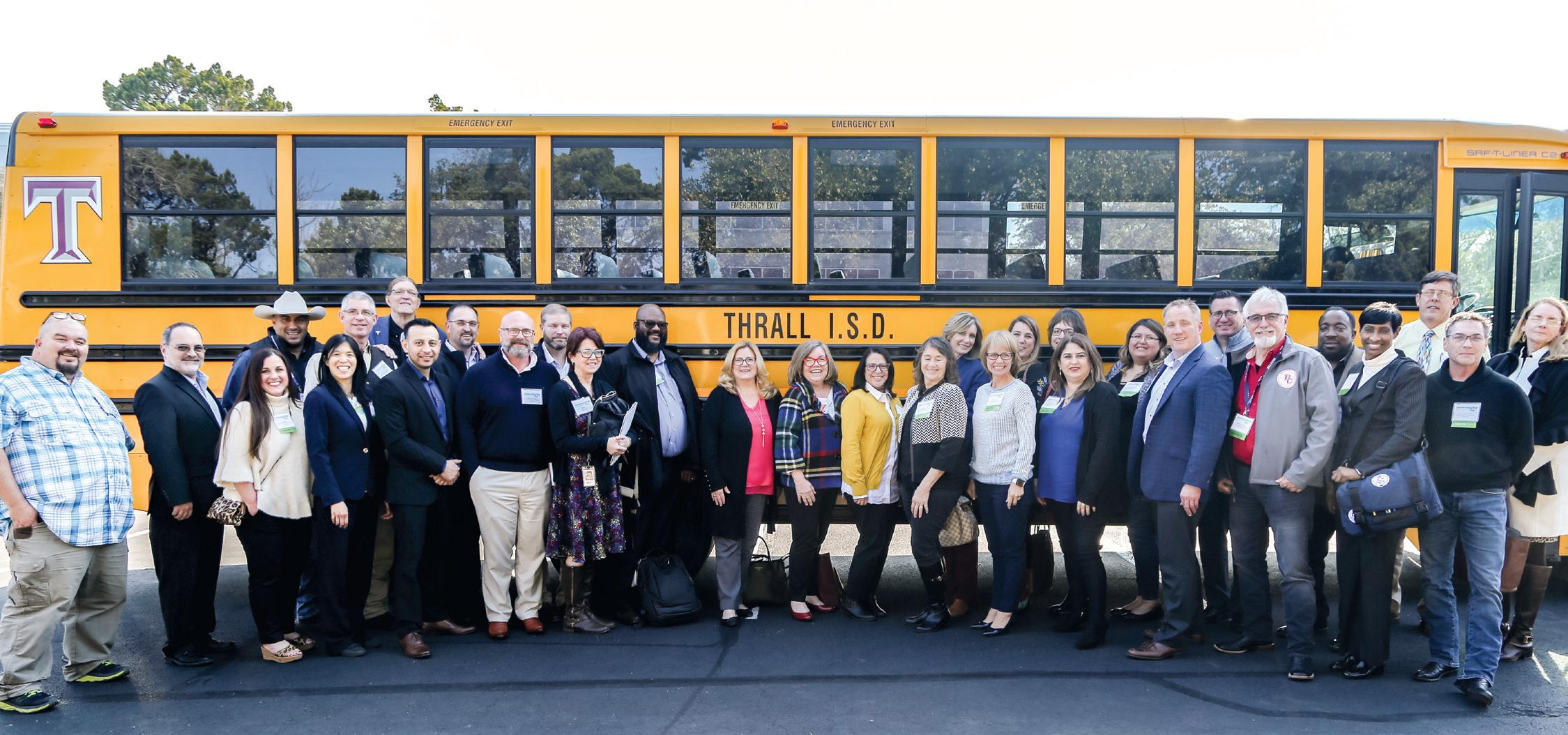
Leadership TASB
The Leadership TASB Class of 2020 started its journey in learning and leadership in Dallas during the 2019 TASA | TASB Convention. Over the next 10 months, 36 class members planned stops in Houston, Austin, El Paso, and Fort Worth. Unfortunately, sessions in El Paso and Fort Worth were canceled due to the ongoing pandemic. For their graduation session, seven “tailgate graduations” were held in August in different locations; class members attended the location of their choice. Representation in the class included all regions of Texas and all sizes of school districts—from 161 students to 189,681 students.
The class chose to study scholarly examples of leadership as represented in current literature. Each of the class’s six teams selected a “classic” and reviewed the work for applicability and relevance to school trustee governance. Additionally, each graduating member earned the designation of Master Trustee.H
22 Texas Lone Star | December 2020 | texaslonestaronline.org
TASB Legal Services professionals provide an online legal update to attendees of txEDCON2020, the virtual 2020 rendition of the annual TASA | TASB Convention held September 30 through October 2.
Photos by TASB Media Services
Members of the Leadership TASB Class of 2020 pose during a class trip to Austin early in the group’s yearlong training. Unfortunately, visits to El Paso and Fort Worth were canceled due to the COVID-19 pandemic.
Highlights 2020 BuyBoard® Launches New Platform
The all-new BuyBoard (Local Government Purchasing Cooperative) platform launched September 1. Significant upgrades were made to bring the ease of online shopping to government procurement while maintaining the compliance focus that districts require. The new BuyBoard includes:
Advanced keyword search and filtering options that allow users to browse by product, vendor, or contract and quickly sort and compare results
A transparent procurement experience where users can see list prices, vendors’ BuyBoard discounts, and product price comparisons across awarded vendors
Attention to compliance matters important to members, along with updates to the RFQ and PO processes

Since the launch, visits have increased significantly as members try out the numerous added features of the all-new application.
Rebates
Each year, the Local Government Purchasing Cooperative sends rebates to eligible BuyBoard members based on purchasing volume. Rebates for the 2019-20 year were record-breaking, with the largest-ever total and largest number of districts eligible. More than $10 million in rebates went out to more than 1,000 BuyBoard members. Since 2006, almost $70 million has been rebated to members.
The Local Government Purchasing Cooperative was created specifically to support and serve Texas public school districts and other local government agencies with the goal of providing competitive pricing, a transparent procurement process, reduced administrative costs, and superior service. The Cooperative is endorsed by TASB, Texas Association of School Administrators, Texas Municipal League, and Texas Association of Counties and is a strategic partner of the Texas Association of School Business Officials.
texaslonestaronline.org | December 2020 | Texas Lone Star 23
2020 Leadership TASB Class
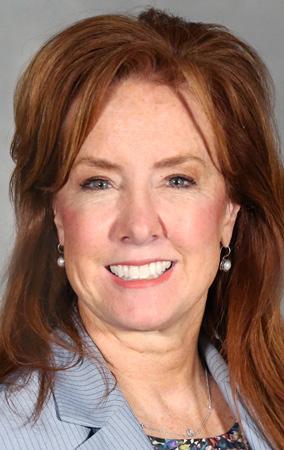
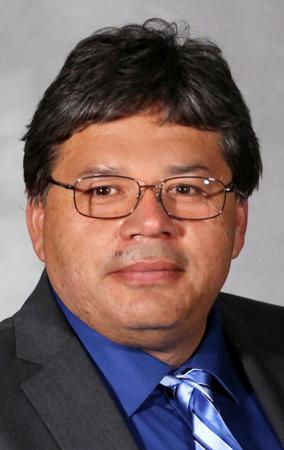

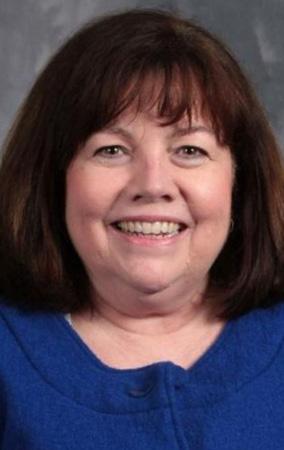
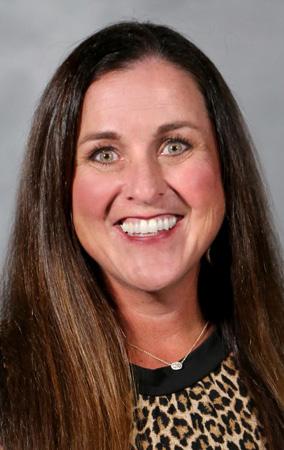
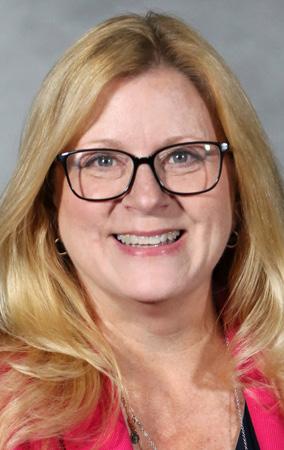
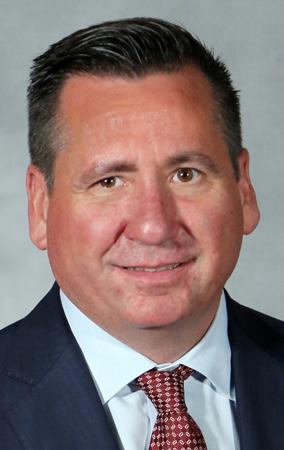
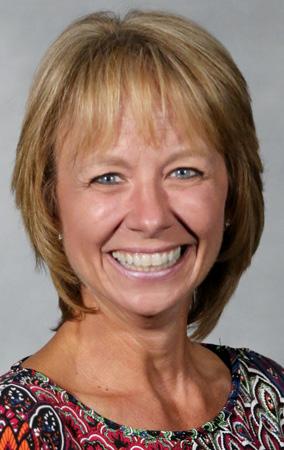
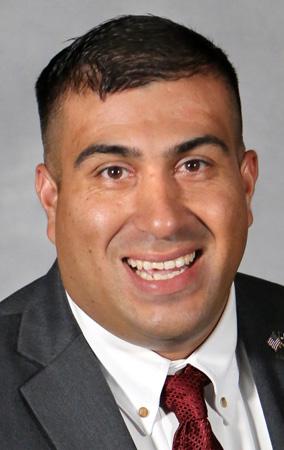

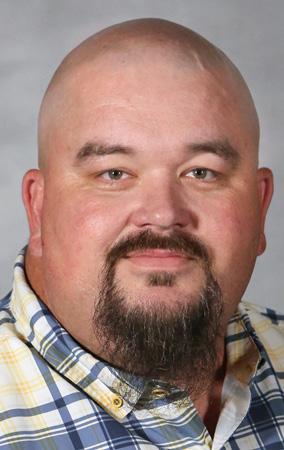
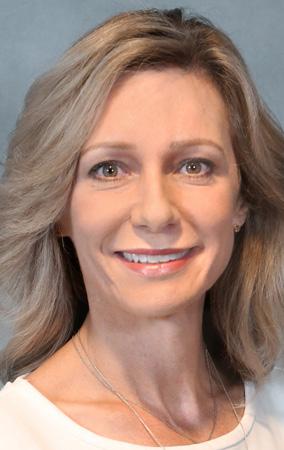
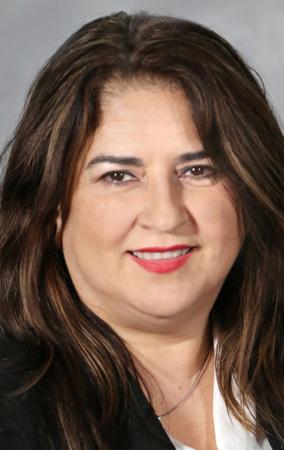
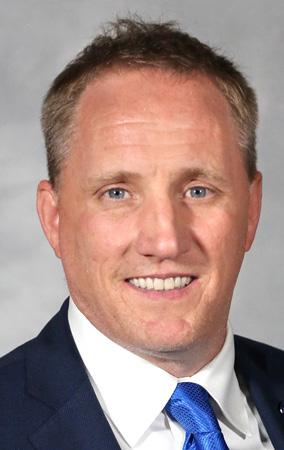
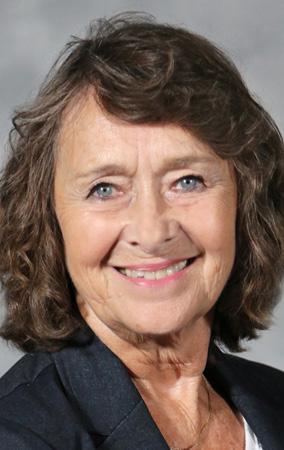
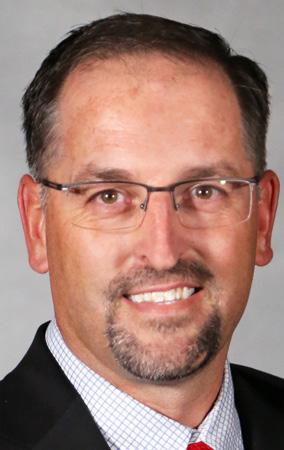
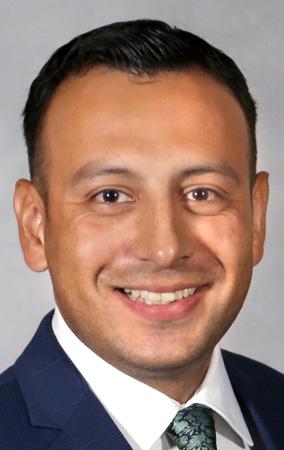
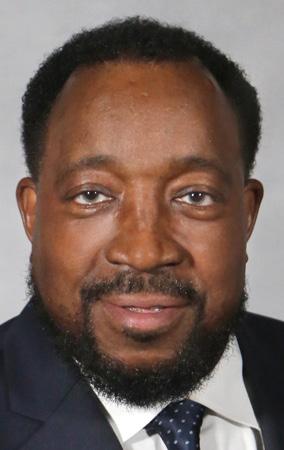
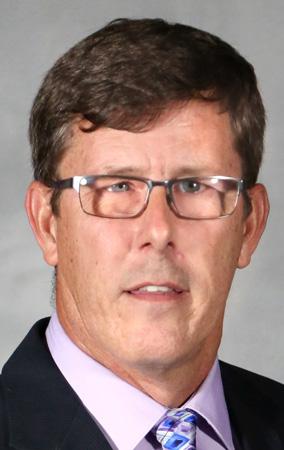
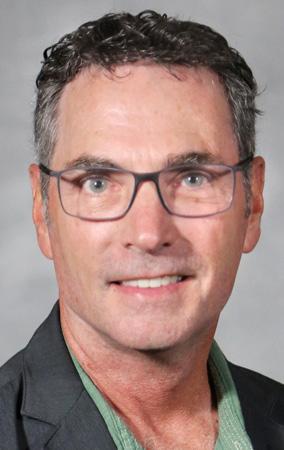
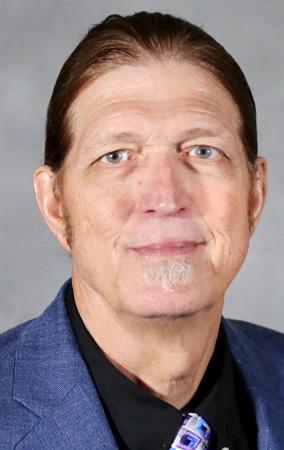
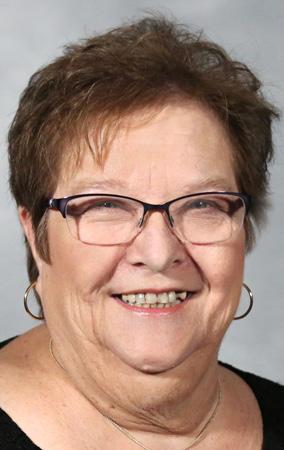

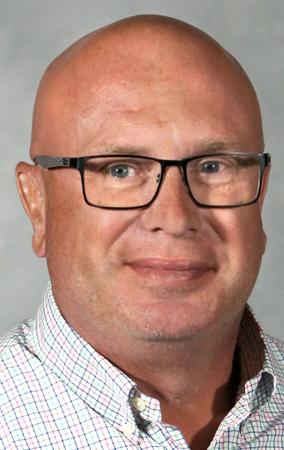

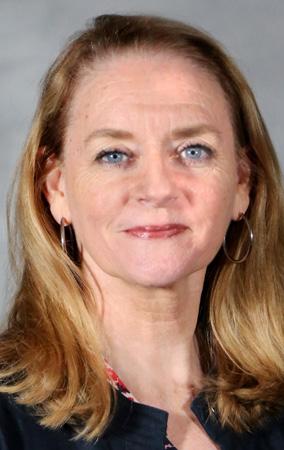
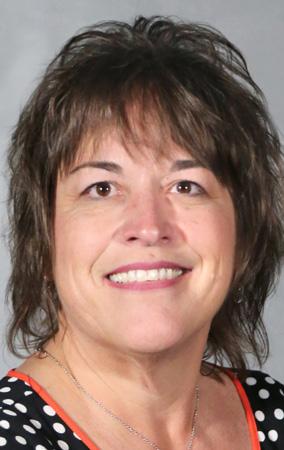
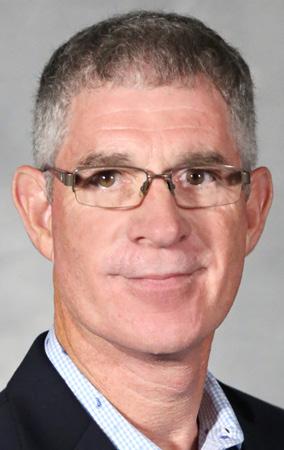
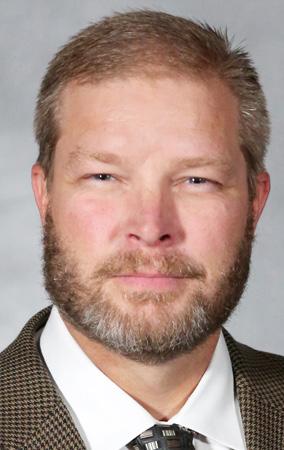
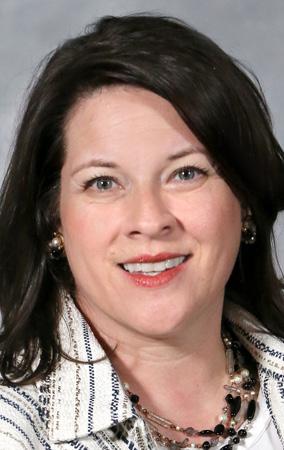
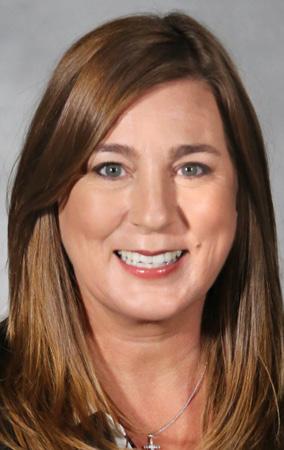
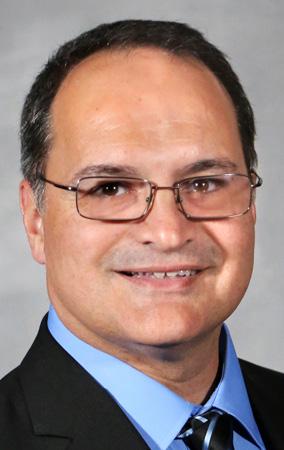
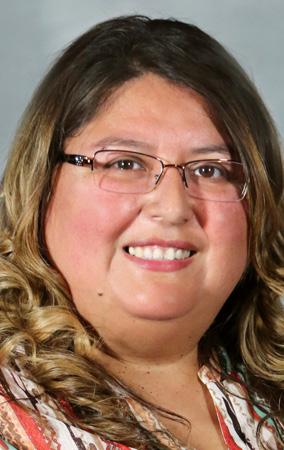
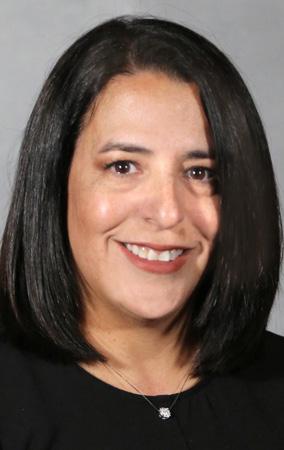
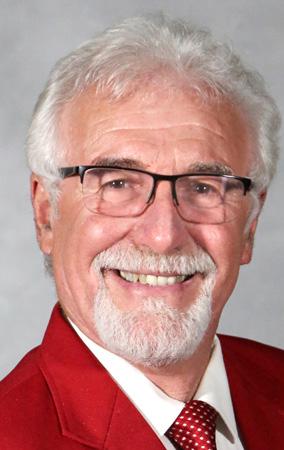
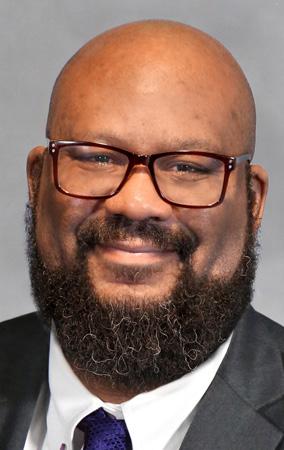

24 Texas Lone Star | December 2020 | texaslonestaronline.org
1. Winford Adams Spring ISD
2. Mark Anderson Bridge City ISD
3. Terri Arthur Beeville ISD
4. Melinda Barajas Mathis ISD
5. Charles Bardwell Huffman ISD
6. Shannon Beasley Medina Valley ISD
7. Nichole Bentley Coppell ISD
8. David Busch Lorena ISD
9. Jerry Campbell Bluff Dale ISD
10. Shelli Conway Anna ISD
11. Leigh Crawshaw West ISD
12. DeLeon English Little Elm ISD
13. Clifton Fendley Paris ISD
14. DeAndrea Fleming DeSoto ISD
15. Barbara Jo Green Forney ISD
16. Tyrrel Grohman Nacogdoches ISD
17. John Havenstrite Eanes ISD
18. Bryan Holubec Thrall ISD
19. Doug James Klein ISD
20. Eulalio Mendez Lyford CISD
21. Keith Myers Burkburnett ISD
22. Patricia Nation Tyler ISD
23. David Noll Allen ISD
24. Eva Orona Robstown ISD
25. Marnie Pate Port Aransas ISD
26. T.J. Penn Rochelle ISD
27. Linda Platt-Bryant West Orange-Cove CISD
28. JD Rodriguez III Dilley ISD
29. Rochelle Ross Hurst-Euless-Bedford ISD
30. Chad Rudy Frisco ISD
31. Katherine Sells Lewisville ISD
32. Amy Smith Lovejoy ISD
33. Suzanne Soto Splendora ISD
34. Anne Sung Houston ISD
35. Joe Uribes Crystal City ISD
1 2 3 4 5 6 7 8 9 10 11 12 13 14 15 16 17 18 19 20 21 22 23 24 25 26 27 28 29 30 31 32 33 34 35 36
36. Andrea Walton Midlothian ISD
Highlights 2020
Special Education Solutions Helps Districts Save Millions

TASB Special Education Solutions (SES) assisted schools in gaining over $206,775,000 in revenue during the school year. These additional funds are used to provide services for children across the state, allowing districts to provide for various unmet needs. In response to growing needs and challenges across the state in special population areas, SES added new services.
For over 27 years, SES has delivered high-quality, integrity-based services and supports to districts in the area of School Health and Related Services (SHARS)/Medicaid. The SES team has continued to enhance services offered to member districts participating in the SHARS program, which allows districts to recoup costs associated with educating students in special education with health-related needs.
The SES team of experienced, qualified personnel who work solely with school districts and/or SHARS strives to collaborate with district staff, listen to concerns, and provide services to help districts help their students. During the school year, SES collaborated to develop new, original resources, such as an e-newsletter, SHARS Matters, and a new monthly SHARS webinar series to help districts better manage their local programs. SES made great strides toward building better, more user-friendly, and comprehensive billing software and continued to work to be one of the top SHARS Medicaid billing vendors in Texas.
The SES annual conference, held virtually this year, had over 300 attendees. The SES team stepped up to help districts manage their programs during the pandemic with resources such as COVID-19 FAQs, webinars, and Provider Relief Fund guidance.
Highlights 2020
TASB Energy Cooperative Growth Continues
The TASB Energy Cooperative, created in 2008 to help governmental entities with procurement of electricity and transportation fuels, reached 399 total members in 2019-20, with 20 new members joining during the fiscal year.
Other highlights during the 2019-20 fiscal year include:
Active membership totaled 270 members, with 191 participating in the electricity program, 79 purchasing fuel products, and 24 members who purchase both electricity and fuel through the Cooperative.
Members purchased over 8.2 million gallons of gasoline, diesel, and propane fuels, with 4.1 million purchased under the fixed-rate program and 4.1
million purchased on the spot market. This was down this year due to the closure of schools related to the COVID-19 pandemic.
Cooperative members in the electricity program have contracted for 1.6 million megawatts of electricity with contracts that extend until 2031.
Energy Cooperative members in deregulated electricity areas in Texas can procure electricity through a service agreement with the retail electric provider awarded by the Energy Cooperative. Members can purchase unleaded gasoline, diesel, and propane from awarded vendors by making a spot market purchase or by participating in the Cooperative’s fixed-rate fuel program.
texaslonestaronline.org | December 2020 | Texas Lone Star 25
Q: What has your board done differently to meet the challenges of this unprecedented school year?
“During this unprecedented school year, our board and administration worked to address the needs of our students, staff, and community. We provided surveys and utilized the data to assist in making decisions to address the educational, nutritional, social, and emotional needs of our community.
“Our board approved the purchase of personal protection equipment for all campuses, which includes masks, face shields, hand sanitizer, sanitizing wipes, and gloves. We also approved the purchase of devices that allowed us to become a 1:1 district and agreed to compensate during the mandated school closures. Our Curriculum & Instruction team deployed synchronous and asynchronous eLearning with socialemotional time embedded within the students’ day. We have also implemented socialemotional sessions for our parents biweekly in the evenings.
“We continue to evaluate the current climate and plan to meet the needs of our community, parents, and students.”
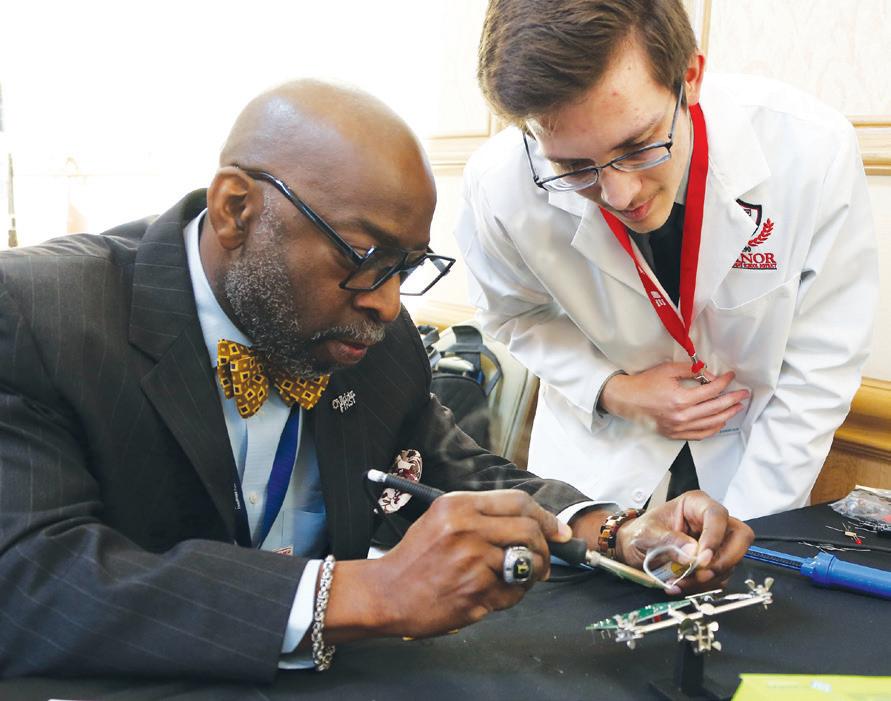 Ty G. Jones, Lancaster ISD Trustee
Ty G. Jones, Lancaster ISD Trustee
Highlights 2020
TASB Facility Services Expands Offerings
This year, TASB Facility Services served 633 member districts and worked on more than 400 environmental, planning, energy, and construction projects.
To better serve members, a new multi-year Planning Membership was developed to assist districts with effectively maintaining and planning for the future of their facilities. Membership includes access to the new online TASB Facility Dashboard, where districts can see information on their facilities and track needed improvements.
Facility Services is working on transforming the OnSite Environmental Database into an online portal through which Facility Services’ Environmental members will be able to view compliance-related and other information.
Facility Services continues efforts to expand service offerings through its preferred providers, Cooperative Strategies, E3, and Farmer Environmental Group. Cooperative Strategies has expanded Facility Services’ offerings into demographics and has strengthened the long-range planning services. E3 performs energy-efficiency projects, and Farmer Environmental Group supports Facility Services’ work to abate and remediate hazardous materials from school facilities.

26 Texas Lone Star | December 2020 | texaslonestaronline.org
Photo by TASB Media Services
TASB STATEMENT OF FOR THE YEAR ENDING AUGUST 31, 2020
TASB has expendable net assets of 53 percent of annual operational expenditures as of August 31, 2020. These figures are subject to Board approval.

Percent Revenue of Total TASB Membership Fees $ 4,257,432 6% Risk Management Services 30,093,448 40 First Public 3,051,084 4 Business Services 14,765,800 20 Governance Services 14,671,922 19 Organization and Planning Services 263,388 0 Royalties and Program Earnings 7,522,925 10 Other 529,084 1 Total Revenue 75,155,083 100% Percent Expenses of Total Employee Compensation and Benefits 51,993,925 73% Purchased and Contract Services 12,187,260 17 Supplies and Materials 1,217,623 2 Other Operating 3,781,822 5 Depreciation and Amortization 2,249,568 3 Total Expenses 71,430,198 100% Change in Net Assets from Operations 3,724,885 Non-Operating Activities: Net Investment Income 5,253,369
Change in Net Assets $ 8,978,254
TASB Revenue & Expenses Activities
texaslonestaronline.org | December 2020 | Texas Lone Star 27
Recognitions, SPECIAL EVENTS LIFTED SPIRITS IN 2020
School Board Recognition Month
School districts all across Texas honored their local boards during January, which was proclaimed School Board Recognition Month for 2020. The theme for this year’s special celebration was “Launching the Next Generation.”
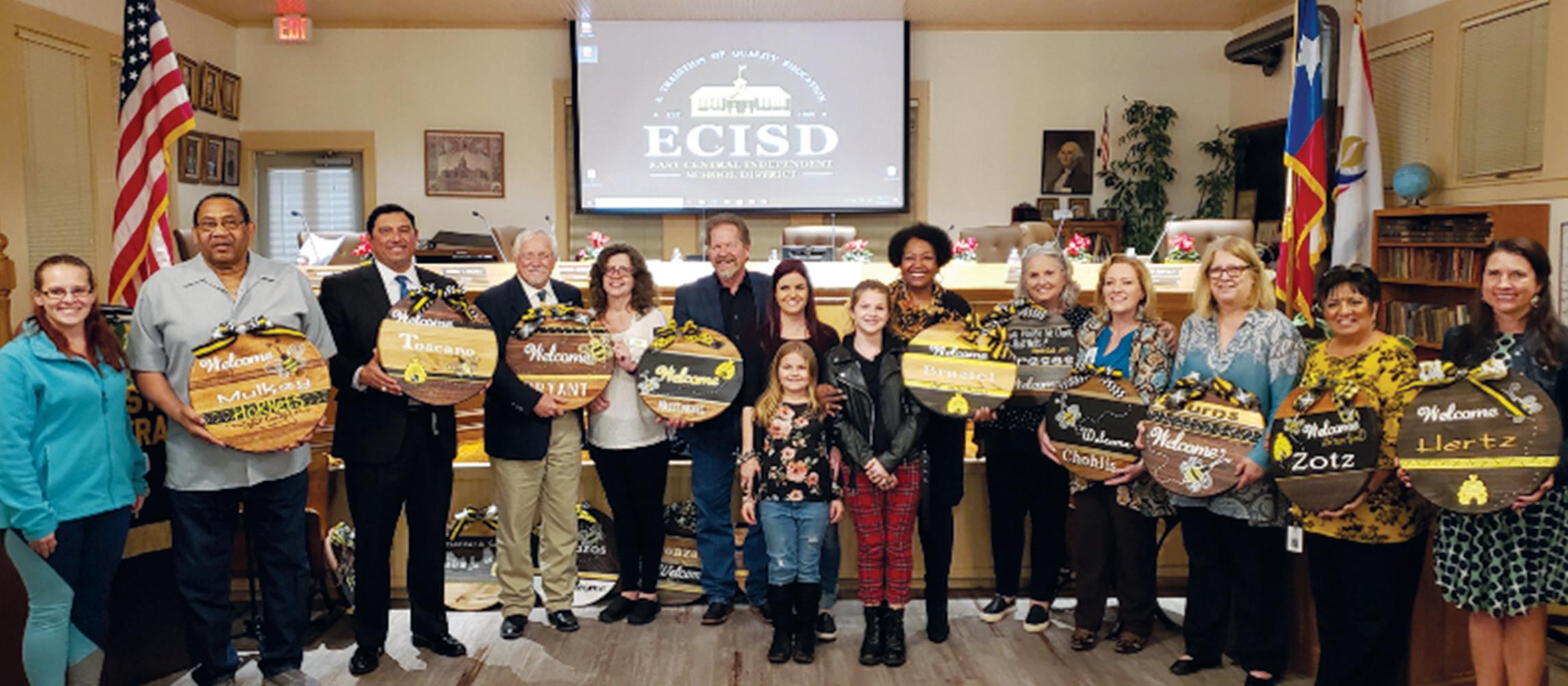

“In every single community in Texas, whether large or small, there is a group of people who take on the responsibility for seeing that the young people in town have good schools. … They are the more than 7,000 locally elected school board members in Texas. They serve tirelessly, often with little recognition and precious little thanks. They generously work behind the scenes taking care of their neighbors, especially the young ones,” author and educator W.F. Strong said in a special video tribute to trustees produced by TASB.
School districts celebrated their local school board members with festivities, student-written “thank you” notes, certificates of appreciation, videos, presentations, and special events. Communities joined in by thanking their local school board members and sharing appreciation using #SchoolBoardMonth on Twitter and Instagram.
Superintendent of the Year
McAllen ISD Superintendent Jose Gonzalez was named the 2020 Superintendent of the Year at the 2020 TASA | TASB Convention. Gonzalez, who has led his district of more than 22,000 students for four years, has served in education administration for 23 years.
Superintendent of the Year finalists were Roland Hernandez of Corpus Christi ISD, Michelle Barrow of
Kudos & Kids ’20
Among the many School Board Recognition Month celebrations statewide in January, East Central ISD board members were presented with personalized plaques made by Heritage Middle School students at a special ceremony.
28 Texas Lone Star | December 2020 | texaslonestaronline.org
Photo courtesy of East Central ISD
Outstanding School Board
The Hurst-Euless-Bedford ISD Board joined McAllen ISD’s Gonzalez as top honorees at Convention, as the HEB ISD Board was named the 2020 Outstanding School Board. The Awards Committee described the HEB ISD Board as purposeful and methodical and was particularly
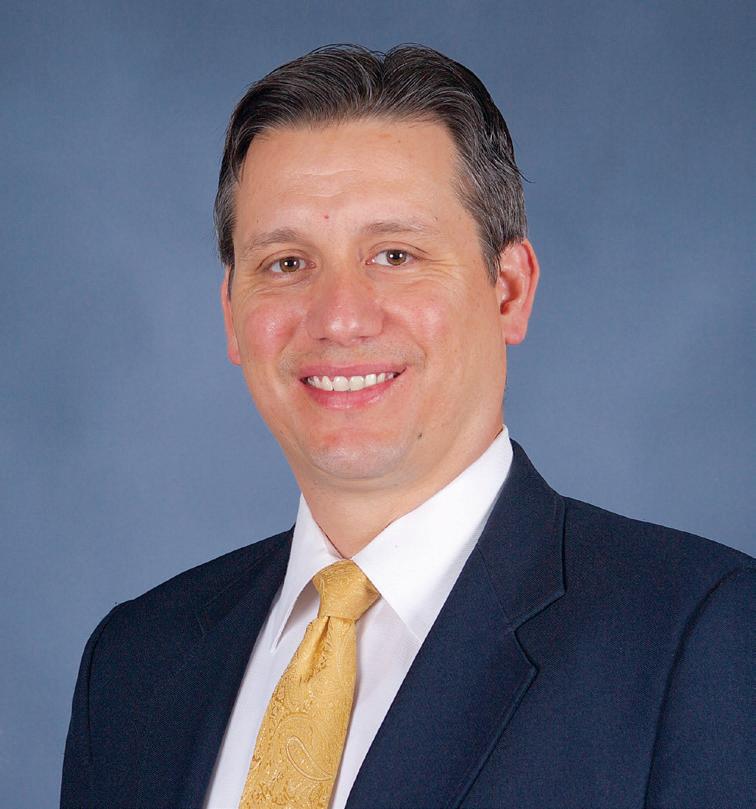
Highlights 2020
HR Services Significantly Expands Outreach


Member outreach for TASB HR Services was more important than ever this year due to the COVID-19 pandemic. HR Services produced 180 articles for the HRX (HR Exchange newsletter), a 25-percent increase over the previous year, covering topics ranging from compensation to recruiting and hiring to COVID-19 response. The HRX saw a 209.57-percent increase in pageviews— from 126,614 in 2018–19 to 391,956 in 2019–20.
In April, an Epidemic Response page was created in the HR Library. Included are links to 87 resources, such as relevant HRX articles, recorded webinars, pandemic-related guidance, flowcharts, and
customizable letters and forms. In the five-month period from inception to the end of the fiscal year, the Epidemic Response page garnered 9,097 pageviews, making it the most viewed page in the HR Library by over 1,200 views.
Efforts to reach members include an HR Services social media presence on Facebook, LinkedIn, and Twitter. The Facebook page earned 38 new fans, with an average post reach of 380 users; the Twitter account gathered 163 new followers, bringing the total to 1,482 followers (with an average of 5,469 impressions per month). On LinkedIn, HR Services gained 58 new followers and averaged 556 impressions per month.
Newton ISD, Jamie Wilson of Denton ISD, and Becky McCutchen of Alpine ISD.
McAllen ISD Superintendent Jose Gonzalez was named 2020 Superintendent of the Year at the 2020 TASA | TASB Convention.
texaslonestaronline.org | December 2020 | Texas Lone Star 29
Photo courtesy of McAllen ISD
impressed by the district’s outstanding student programs, commitment to quality, formalized policymaking process, and the fact that the board is “part of the fabric of the community.”
Board members are President Julie Cole, Vice-President Matt Romero, Secretary Rochelle Ross, and members Dawn Jordan-Wells, Faye Beaulieu, Andy Cargile, and Fred Campos. Superintendent is Steve Chapman. Outstanding Board finalists named as Honor Boards were the boards from Mesquite, Sheldon, Temple, and Tornillo ISDs.
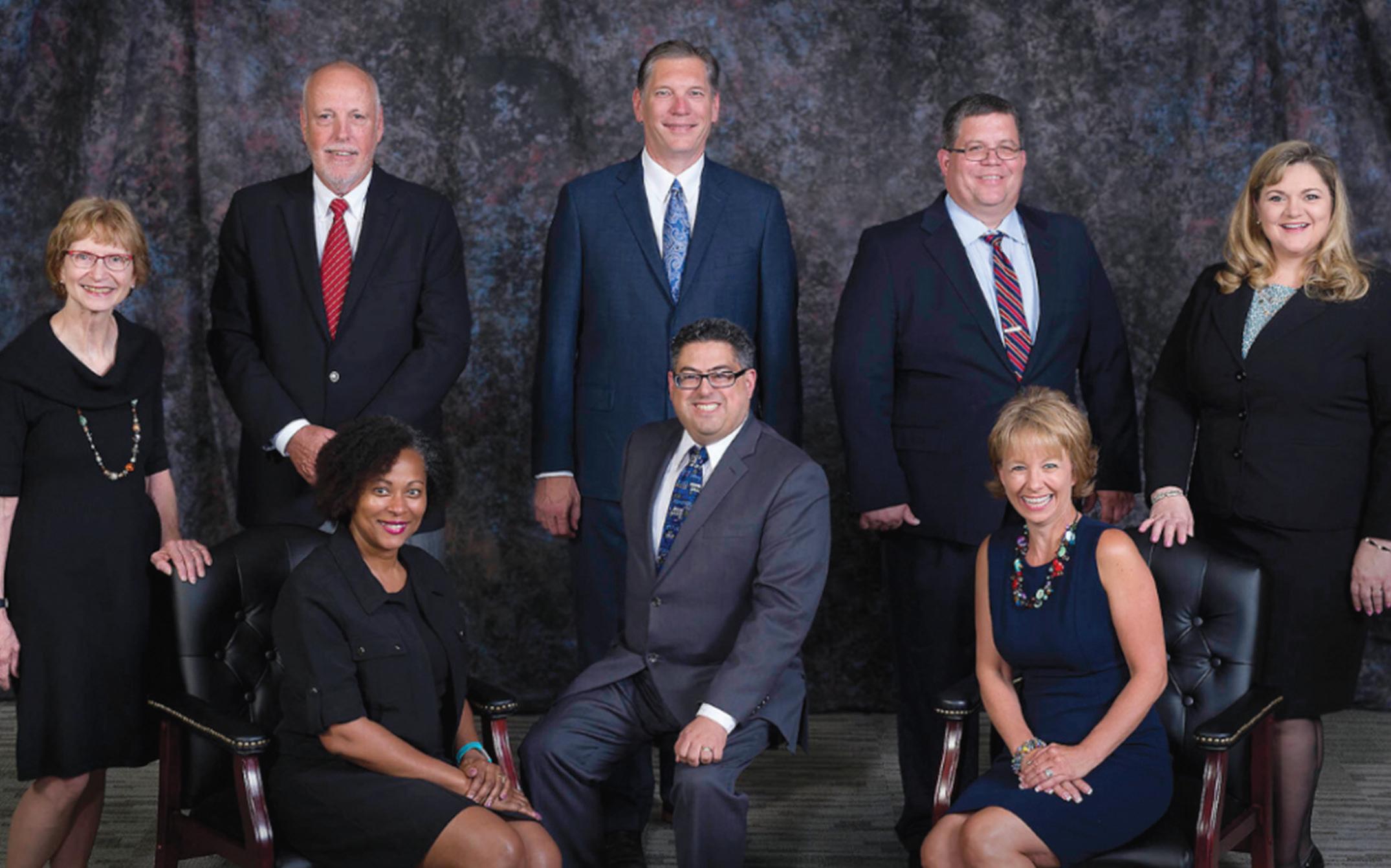
TSPRA Key Communicator
Former Austin ISD Communications Director and longtime education reporter Andy Welch was named the recipient of the Key Communicator Award for 2020 by the Texas School Public Relations Association (TSPRA).
Celebrate Your School Board in January 2021
January is School Board Recognition Month, and districts are invited to recognize the dedicated work of their school trustees. This annual celebration is a time to focus on the crucial role school board members play in our communities and schools. The theme is awash with potential: Navigating to Success.
Online Resource Kit Available

Throughout his remarkable career in communications, Welch served as a State Capitol reporter for daily newspapers and radio stations across the state, served on the staff of Texas Agriculture Commissioner Jim Hightower, promoted Texas foods, wines, and organic produce, and worked as communication director for State Comptroller John Sharp.H
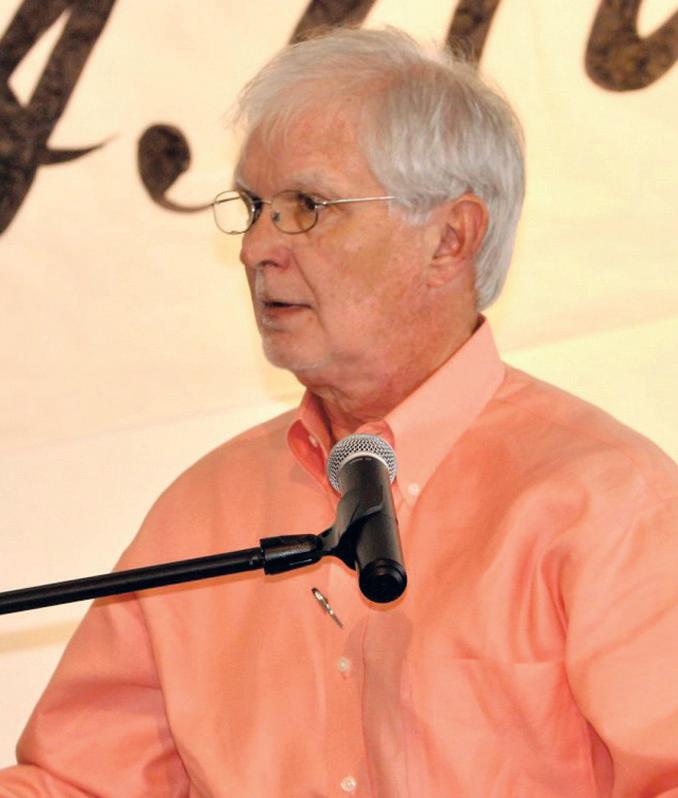
A resource kit is posted on sbrm.tasb.org to help districts recognize their local trustees. The kit, centered on the 2021 theme of Navigating to Success, offers ideas for honoring board members and letting the community know of their many contributions. Customizable social media graphics, artwork, a sample news release, and more are included. Certificates and some ideas to get you started celebrating were mailed directly to districts in October.
During the month of January, be sure to use #SchoolBoardMonth on Twitter and Instagram and follow TASB on social media to see how other districts are celebrating.
Even though showing appreciation should be a year-round process, taking advantage of the designated School Board Recognition Month in January ensures that these important people receive some of the thanks they deserve.
For more information about School Board Recognition Month, contact communications@tasb.org.
The Hurst-Euless-Bedford ISD Board of Trustees was named the 2020 Outstanding Board of Texas at Convention this year. Board members are (sitting from left) Dawn Jordan-Wells, Fred Campos, Secretary Rochelle Ross, (standing from left) Faye Beaulieu, Andy Cargile, Superintendent Steve Chapman, Vice-President Matt Romero, and President Julie Cole.
Photo courtesy of Hurst-Euless-Bedford ISD
Former Austin ISD Communications Director and longtime education reporter Andy Welch was named the recipient of the Key Communicator Award for 2020 by the Texas School Public Relations Association.
30 Texas Lone Star | December 2020 | texaslonestaronline.org
Photo courtesy of TSPRA
Q: What has your board done differently to meet the challenges of this unprecedented school year?
“San Benito CISD is a proud school district that takes pride in our excellent teachers and staff. We have been blessed to have the community behind us on our important decisions in these unprecedented times.
“SBCISD is utilizing an asynchronous instruction model and will transition to face-to-face instruction as per state and local mandates. Students will engage in learning materials on their own time, interacting intermittently with the teachers via computer or other electronic devices or over the phone. To ensure success of all students, each of them were provided with a device, a hotspot, and school supplies and instructional guides for students and parents—including videos and remote access to instructional platforms. Teachers have been in constant communication with the students and parents to monitor progress and address any additional needs.
“San Benito is committed to providing a gold-standard education even during COVID. Here at our district we have a wonderful food program. We have over 9,000 students, and all our students are provided free breakfast and free lunch. Our students are provided warm meals to ensure they have food every day. Our students are provided meals from Monday to Sunday. Our meals are served curbside in front of each school. Not only do we have curbside, but we also deliver our meals to our students via bus. We try to visit children whose parents don’t have a vehicle, and we try to make it easy for them. We realize how important it is for our students to be able to eat well-balanced meals. Our children are very important to us. Giving them nutritional meals helps them be more productive and enjoy different meals every day.
“Our board and our district are very happy to accommodate our precious students and keep the teachers and students happy during these difficult times.”
Janie G. Silva, San Benito CISD Trustee
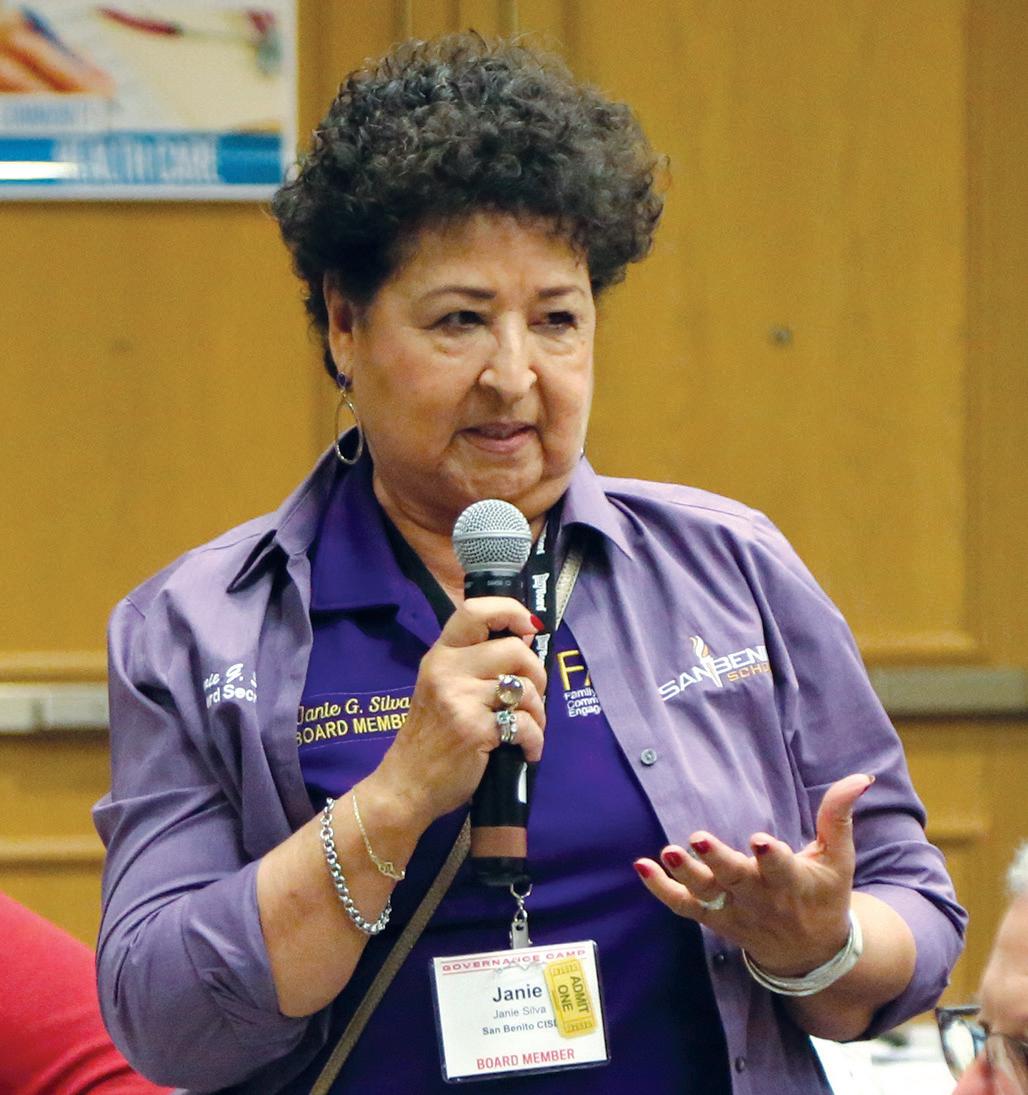

texaslonestaronline.org | December 2020 | Texas Lone Star 31
Photo by TASB Media Services
Highlights 2020

Community College Services Assists in COVID-19 Response
During this past year, TASB’s Community College Services provided legal and policy education and resources to assist colleges as they responded to the COVID-19 pandemic and several significant regulatory changes, including the update to the Title IX regulations. In addition to the FAQs published on TASB College eLaw, Community College Services attorneys and policy specialists provided training at several state and regional virtual events. The team also began offering webinars on special topics.
Community College Services issued three updates to the Community College Policy Reference Manual, including a special update to address the new Title IX regulations. The team completed a policy localization project and began three others, bringing the total number of colleges that maintain their board local policies with Community College Services to 38 of the 50 Texas community colleges.
Community College Services also launched a free online newsletter, Community College Legal Update. The monthly newsletter includes summaries of recent court and attorney general opinions, regulatory changes, and news that affect Texas community colleges.

32 Texas Lone Star | December 2020 | texaslonestaronline.org
Q: How have your district and community risen to the many challenges of this school year?
“Clear Creek ISD (CCISD) has seen many successes from a safety perspective as a result of COVID-19. Early in the pandemic, we established the CCISD Safely Re-open Committee. CCISD has a robust, diverse, engaged, and experienced community. By utilizing an already established and successful School Safety Committee familiar with district needs and expectations, the Safety Committee was altered to also include and increase membership with local and county health care experts, mental health advocates, and educational and operations staff. In addition, CCISD students created a Students 4 Safety Committee to enable a CCISD student perspective and voice to work in collaboration as a part of the Safely Re-open Committee.
“The design and creation of departmental Pandemic Standard Operating Procedures allows us to utilize our locally developed, living documents resulting in uniformity and comprehension in district procedures, expectations, and safety. These provided the opportunity for every CCISD employee, student, and community member to take ownership in the reopening process.
“Our increased time for staff training, methodical approach to the startup of extracurricular activities, and phased-in return of student groups to campus allowed for CCISD to continually assess data and the effectiveness of our established procedures. The data assessment is continual and is reevaluated every two weeks.
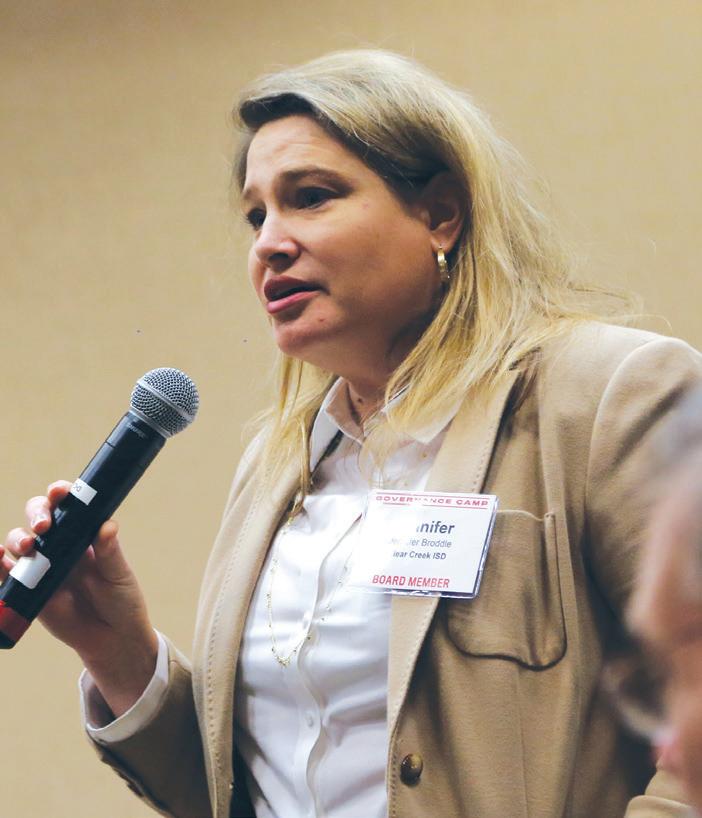
“Finally, the design and implementation of a COVID-19 Dashboard, created by CCISD Technology, has enabled us to collect accurate and detailed contact tracing data and provide an effective and efficient platform for Health Services to manage and analyze cases and trends.”

texaslonestaronline.org | December 2020 | Texas Lone Star 33
Jennifer Broddle, Clear Creek ISD Trustee
Photo by TASB Media Services
Director’s Chair
Resilient, RESOURCEFUL, AND RESOLUTE

District Leaders across Texas Met Myriad Challenges of 2020
by James B. Crow
Tumultuous. Unprecedented. Challenging. Disheartening. Unbelievable.
These are just a few of the adjectives that have been used to describe the year 2020. From a worldwide pandemic of historic proportions and the subsequent economic crisis that followed to nationwide social unrest and mistrust to the bitterly divided political atmosphere that pervades the country, this has been a year like no other in recent memory.
And yet, amid this chaos and concern, these words come to mind when I consider how our local public education leaders have responded to the turmoil: Resilient. Resourceful. Resolute. Dedicated. Innovative.
In districts large and small, urban and rural, from the Panhandle to the Valley, school board members, administrators, teachers, and staff went swiftly into action to ensure continued student learning as the scope of the COVID-19 crisis became apparent in early spring.
New Protocols, Partnerships
In Texas City ISD, for example, Trustee Melba Anderson shared that her district, like so many others, quickly developed protocols for in-person and online instruction, ensuring that every student had necessary access and resources. “Faced with the technology hurdle created by the pandemic, our board of trustees found the funding and supported an initiative that provided laptops to all district students,” Melba noted. “Hotspots were also provided to those students who did not have internet service at home.”
In Clear Creek ISD, district leaders partnered closely with community entities to meet student and staff needs. “By utilizing an already established and successful School Safety Committee familiar with district needs and expectations, the Safety Committee was altered to also include and increase
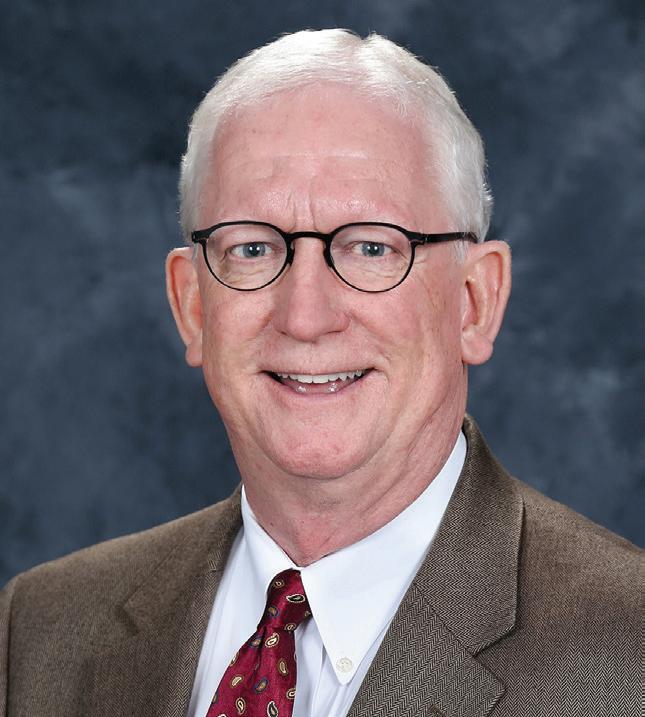
membership with local and county health care experts, mental health advocates, and educational and operations staff,” reported Clear Creek ISD Trustee Jennifer Broddle.
These are but two examples of the decisive and bold steps local school district leadership teams took to keep students safe, secure, and ultimately academically successful.
Moving Ahead
However, many challenges remain. The pandemic shows no signs of abating; the country is still tense and divided on many fronts; social justice remains a vital concern for so many across our land.
To stand with districts going forward into 2021 and beyond, TASB continues to answer the call. Aside from the myriad virtual events and resources developed by Association staff this year, TASB took further concrete steps, including calling on the 87th Texas Legislature to assist local school districts with increased funding, easing of state assessment administration, assistance in updating district technology to enhance virtual learning, and more. No fewer than 16 new Resolutions specifically related to COVID-19 concerns were passed by the TASB Delegate Assembly this year.
34 Texas Lone Star | December 2020 | texaslonestaronline.org
James B. Crow
And importantly, a new Cornerstone Principle was added to the TASB Advocacy Agenda this year. Cornerstone Principles are the bedrock of the Association’s stand regarding organizational conduct and beliefs.
This new Cornerstone Principle states that TASB will work toward the following:

“Promotion of equity, intentional eradication of systemic racism, and the recognition of all cultures and races that have contributed to the rich history of Texas and the United States to include support for diversity and cultural awareness initiatives throughout the state.”
Indeed, it has been a year like no other. I commend each local school board member, superintendent, administrator, teacher, and staff member—and especially the students, parents, and citizens of each community—for your unwavering determination, diligence, spirit of innovation, and patience in these uncertain times.
Let’s move ahead and look to the new year with the hope of healing, cooperation, civility, and respect for one another as our nation, our state, and our communities come together for a brighter future.H
 James B. Crow is executive director of TASB.
James B. Crow is executive director of TASB.

NONPROFIT ORG US POSTAGE PAID AUSTIN TEXAS PERMIT NO 1422 Texas Association of School Boards P.O. Box 400 Austin, Texas 78767-0400
Deepak Chopra
—
“CHALLENGES ARE SOLVED BY
Rising
TO A LEVEL HIGHER THAN THE CHALLENGE.”


 Photo by TASB Media Services
Photo by TASB Media Services






 Jim Rice
Jim Rice


















 Jim Rice President
Ted Beard President-Elect
Jim Rice President
Ted Beard President-Elect





















































 Ty G. Jones, Lancaster ISD Trustee
Ty G. Jones, Lancaster ISD Trustee



















 James B. Crow is executive director of TASB.
James B. Crow is executive director of TASB.
